Author: Bao Ngan Nguyen
ในหัวข้อเกี่ยวกับโรงเรียนในภาษาอังกฤษ ครูถือเป็นความรู้ส่วนหนึ่งที่ผู้เรียนควรเข้าใจด้วยเพื่อจะได้นำไปใช้ในการสื่อสารได้อย่างถูกต้อง ดังนั้น เพื่อให้เข้าใจได้อย่างชัดเจนว่าครูภาษาอังกฤษคืออะไร บทความต่อไปนี้ ELSA Speak จะยกตัวอย่างคำศัพท์และตัวอย่างประโยคการสื่อสารโดยละเอียดมาฝากเพื่อนๆทุกคน
ครูภาษาอังกฤษคืออะไร?
คำว่าครูภาษาอังกฤษสำหรับใช้ที่โรงเรียนหรือมหาวิทยาลัยออกเสียงว่า “Teacher” ซึ่ง /ˈtiːtʃər/ มีความหมายว่าเป็นหนึ่งในคนที่ทำงานสอนและแนะแนวนักเรียน นักศึกษา หรือผู้เรียนในสถานศึกษา เช่น โรงเรียน ศูนย์ฝึกอบรม หรือองค์กรการศึกษาอื่นๆ
10 คำศัพท์ภาษาอังกฤษทั่วไปเกี่ยวกับครู

| คำศัพท์ | คำอ่าน | ความหมาย | ตัวอย่าง |
| Teacher | /ˈtiː.tʃər/ | Teacher ในภาษาอังกฤษหมายถึงผู้ที่สอนให้ความรู้แก่ผู้อื่น คำนี้มักจะหมายถึงครูในระบบโรงเรียนหรือมหาวิทยาลัย นอกจากครูผู้สอนที่โรงเรียนแล้ว คำว่า ครู ยังใช้เรียกครูสอนพิเศษอีกด้วย | James is an English teacher, he works at my school. (เจมส์เป็นครูสอนภาษาอังกฤษ เขาทำงานที่โรงเรียนของฉัน) |
| Coach | /kəʊtʃ/ | Coach ในภาษาอังกฤษหมายถึงบุคคลที่สอนหรือฝึกสอนกีฬาทักษะต่างๆ หรือสามารถอ้างถึงวิชาของโรงเรียนก็ได้ มักใช้เรียกผู้ฝึกสอนกีฬาที่เน้นการพัฒนานักกีฬาหรือทีมกีฬา เช่น โค้ชว่ายน้ำ โค้ชบาสเกตบอลหรือโค้ชฟุตบอล ฯลฯ | Smith was appointed as head coach. (สมิธได้รับการแต่งตั้งให้เป็นหัวหน้าโค้ช) |
| Guru | /ˈɡʊr.uː/ | ความหมายตามพจนานุกรมของคำว่า guru คือผู้นำศาสนาหรือครูในศาสนาฮินดูหรือซิกข์ อีกความหมายหนึ่งคือผู้ชำนาญเฉพาะด้านหรือผู้ที่มีทักษะบางอย่างจนสามารถให้คำแนะนำแก่ผู้อื่นได้ | Peter has become the computer guru in our department. (ปีเตอร์กลายเป็นผู้เชี่ยวชาญด้านคอมพิวเตอร์ในแผนกของเรา) |
| Trainer | /ˈtreɪ.nər/ | Trainer หมายถึงผู้ฝึกสอนบุคคลที่สอนทักษะให้คนหรือสัตว์ให้ทำกิจกรรมบางอย่าง ต่างจากคำว่า “Coach” ตรงที่ “Coach” เน้นการพัฒนานักกีฬาหรือทีมกีฬา แต่ “Trainer” จะฝึกนักเรียนในด้านทักษะการกีฬาโดยเน้นการสอนเพื่อให้นักเรียนบรรลุเป้าหมายด้านสุขภาพได้ ในประเทศไทย คำว่า Trainer มักใช้เรียกคนที่ช่วยสอนการออกกำลังกายเพื่อสุขภาพ เช่น การลดน้ำหนัก เป็นต้น | She works as a trainer for pharmaceutical company staff. (เธอทำงานเป็นผู้ฝึกสอนให้กับพนักงานบริษัทเภสัชกรรม) |
| Professor | /prəˈfes.ər/ | Professor หมายถึงตำแหน่งอาจารย์สูงสุดในมหาวิทยาลัยของอังกฤษแต่ในสหรัฐอเมริกาหมายถึงศาสตราจารย์อาวุโสในมหาวิทยาลัยหรือวิทยาลัย นอกจากจะใช้เรียกบุคคลที่เป็นอาจารย์แล้ว คำนี้ยังใช้กับผู้ที่สอนหลักสูตรขั้นสูงในมหาวิทยาลัยที่ไม่มีตำแหน่งศาสตราจารย์ได้ด้วย | Piper was elected to the position of associate professor in 2020. (ไพเพอร์ได้รับเลือกให้ดำรงตำแหน่งรองศาสตราจารย์ในปี 2020) |
| Mentor | /ˈmen.tɔːr/ | Mentor ใช้เพื่ออ้างถึงคนที่ช่วยเหลือหรือให้คำแนะนำแก่คนที่อายุน้อยกว่าหรือมีประสบการณ์น้อยในช่วงระยะเวลาหนึ่ง โดยปกติจะเป็นการช่วยเหลือในที่ทำงานหรือที่โรงเรียนคำนี้ไม่เหมือนกับคำ ครู ที่ใช้ในโปรแกรมการศึกษาทั่วไป เพราะมักใช้สำหรับผู้ที่สอนทั้งในชีวิตและความรู้ ความสามารถหรือทักษะ หรือสอนผู้มีประสบการณ์น้อย | She acted as a business mentor to many young entrepreneurs. (เธอทำหน้าที่เป็นที่ปรึกษาทางธุรกิจให้กับนักธุรกิจรุ่นใหม่หลายคน) |
| Tutor | /ˈtʃuː.tər/ | Tutor ในภาษาอังกฤษหมายถึงครูผู้สอนนักเรียนนอกระบบการศึกษา ปกติมักใช้กับผู้สอน ที่โดยทั่วไปสอนที่บ้านหรือสถานที่อื่นๆ นอกโรงเรียน สอนตัวต่อตัวหรือเป็นกลุ่มเล็ก | Her parents got her a tutor to help with her maths. (พ่อแม่ของเธอมีครูสอนพิเศษเพื่อให้เธอช่วยสอนวิชาคณิตศาสตร์) |
| Pro | /prəʊ/ | Pro หมายถึงคนที่เก่งบางสิ่งบางอย่างหรือเป็นมืออาชีพ เรามักได้ยินคำว่า “pro” ที่ใช้เรียกนักกีฬามืออาชีพที่กลับมาสอนคนอื่นๆ เช่น นักกอล์ฟมืออาชีพ เป็นต้น | Akin wants to be a tennis pro when he grows up.(เมื่อโตขึ้นอคินอยากเป็นนักเทนนิสมืออาชีพ) |
| Instructor | /ɪnˈstrʌk.tər/ | Instructor ในภาษาอังกฤษ หมายถึง ครูที่รับผิดชอบในการสอนทักษะหรือปฏิบัติงานบางอย่าง หรือคำนี้ใช้เรียกครูในมหาวิทยาลัย/วิทยาลัยที่มีนักศึกษาจำนวนจำกัดและมีตำแหน่งต่ำกว่า “ศาสตราจารย์” | He confirms that this is normal practice for instructor. (เขายืนยันว่านี่คือการปฏิบัติตัวปกติของผู้สอน) |
| Lecturer | /ˈlek.tʃər.ər/ | Lecturer ในภาษาอังกฤษหมายถึงครูหรือผู้สอนในวิทยาลัยหรือมหาวิทยาลัย บางครั้งในภาษาไทยอาจหมายถึง “อาจารย์” อาจารย์ที่มีตำแหน่งอาจารย์หรืออาจไม่ได้สำเร็จการศึกษาโดยตรงจากหลักสูตรการศึกษา แต่มีความรู้และความเชี่ยวชาญเพียงพอในสาขาวิชาเฉพาะที่ได้รับเชิญให้สอน | She taught design for 3 years as a part-time lecturer. (เธอสอนการออกแบบเป็นเวลา 3 ปีในฐานะอาจารย์พิเศษ) |
| Adviser | /ədˈvaɪz/ | Adviser หมายความว่า อาจารย์ที่ปรึกษาให้คำแนะนำทางวิชาการหรือเส้นทางในอนาคตแก่นักศึกษา คำนี้อาจหมายถึงที่ปรึกษาในด้านธุรกิจ การวางแผนนโยบาย หรือสิ่งอื่น | I waited so long for my turn to see my adviser that I missed my train. (ฉันรอที่จะได้พบอาจารย์ที่ปรึกษาของฉันนานมากจนตกรถไฟ) |
| Counselor | /ˈkaʊn.səl.ɚ/ | Counselor คือครูที่ให้คำปรึกษาทั้งด้านวิชาการและชีวิตส่วนตัว นอกจากนี้ยังสามารถนำไปใช้กับครูที่ดูแลกลุ่ม ชมรม การชุมนุม ทีมกีฬาหรือค่ายได้อีกด้วย | As a camp counselor, he told fireside tales about his experiences. (ในฐานะที่ปรึกษาค่าย เขาเล่าเรื่องราวข้างกองไฟเกี่ยวกับประสบการณ์ของเขา) |
>>> Read more: คำศัพท์เกี่ยวกับอาชีพภาษาอังกฤษสำหรับทุกอาชีพ
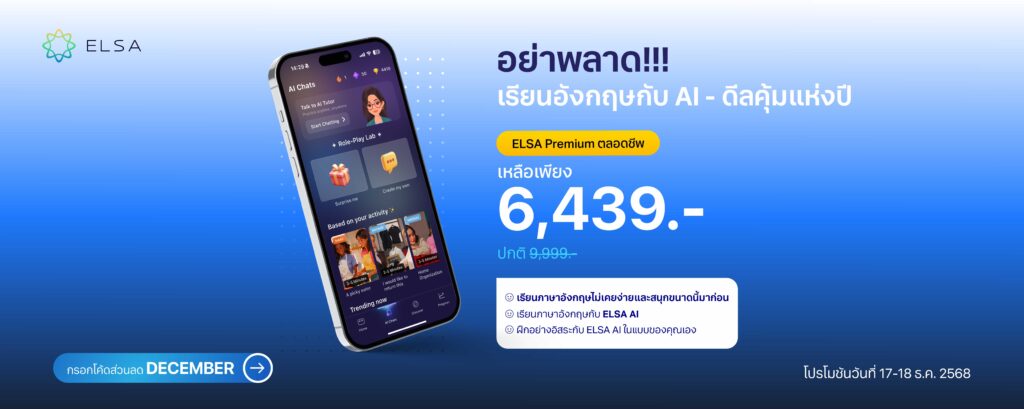
คำศัพท์เกี่ยวกับครูเฉพาะวิชา
| คำศัพท์ | คำอ่าน | ความหมาย | ตัวอย่าง |
| Homeroom Teacher | /ˈhəʊmruːm ˈtiːʧə/ | ครูประจำชั้นเป็นผู้รับผิดชอบห้องเรียนตลอดทั้งปีการศึกษา พวกเขาไม่เพียงแต่สอนวิชาต่างๆ แต่ยังจัดการกิจกรรมในชั้นเรียนในแต่ละวัน รวมถึงการเข้าเรียน การสื่อสารกับผู้ปกครอง และการแก้ไขปัญหาที่เกี่ยวข้องกับนักเรียน | Ms. Smith is the Homeroom Teacher for Grade 5 at Chiang Mai Elementary. (คุณครูสมิธเป็นครูประจำชั้นประถมศึกษาปีที่ 5 ของโรงเรียนประถมศึกษาในเชียงใหม่) |
| Preschool Teacher | /ˌpriːˈskuːl ˈtiːʧə/ | ครูอนุบาลเป็นคนที่สอนและดูแลเด็กวัยก่อนเรียน (อายุ 3 ถึง 6 ปี) พวกเขามุ่งเน้นไปที่การพัฒนาทักษะพื้นฐานของเด็ก เช่น การสื่อสาร ทักษะทางสังคม และการเรียนรู้ก่อนวัยเริ่มเรียน ผ่านกิจกรรมการเล่นและการเรียนรู้ | Mrs. Hone is a Preschool Teacher at Sunny Day Nursery. (คุณโฮนเป็นครูอนุบาลที่โรงเรียนอนุบาลซันนี่เดย์) |
| Student Teacher หรือ Intern Teacher | /ˈstjuːdᵊnt ˈtiːʧə ˈɪntɜːn ˈtiːʧə/ | นักศึกษาฝึกสอนเป็นนักศึกษาที่กำลังศึกษาด้านการศึกษาและฝึกงานเพื่อรับประสบการณ์การสอนภายใต้การดูแลของอาจารย์ที่มีประสบการณ์ พวกเขามักจะช่วยเหลือครูหลักในการเรียนการสอนและการจัดการห้องเรียน | Mike is a Student Teacher at Cambridge High School, working with Mr. Henry. (ไมค์เป็นนักศึกษาฝึกสอนที่ Cambridge High School และทำงานร่วมกับคุณเฮนรี่) |
| Math Teacher | /mæθ ˈtiːʧə/ | ครูสอนคณิตศาสตร์เป็นผู้สอนคณิตศาสตร์ ตั้งแต่แนวคิดพื้นฐาน เช่น เลขคณิต ไปจนถึงหัวข้อขั้นสูง เช่น พีชคณิต เรขาคณิต และคณิตศาสตร์ประยุกต์ ช่วยให้นักเรียนพัฒนาความสามารถในการวิเคราะห์และการแก้ปัญหาผ่านแบบฝึกหัดและบทเรียน | Mr. Nan is a Math Teacher at Cambridge School, teaching algebra and calculus. (คุณครูแนนเป็นครูสอนคณิตศาสตร์ที่โรงเรียนเคมบริดจ์ซึ่งสอนพีชคณิตและแคลคูลัส) |
| Elementary School Teacher | /ɛlɪˈmɛntᵊri skuːl ˈtiːʧə/ | ครูประถมศึกษาเป็นคนที่สอนนักเรียนตั้งแต่ชั้นประถมศึกษาปีที่ 1 ถึงชั้นประถมศึกษาปีที่ 6 โดยสอนวิชาพื้นฐาน เช่น คณิตศาสตร์ ภาษาอังกฤษ วิทยาศาสตร์ และสังคมศึกษา รวมถึงสนับสนุนการพัฒนาโดยรวมของนักเรียนในวัยเด็ก | Ms. Jen is an Elementary School Teacher at Bangkok School, where she teaches Grade 3. (คุณครูเจนเป็นครูประถมศึกษาที่โรงเรียนกรุงเทพ โดยสอนชั้นประถมศึกษาปีที่ 3) |
| Foreign Teacher | /ˈfɒrən ˈtiːʧə/ | ครูชาวต่างชาติครูที่มาจากประเทศอื่นและสอนในโรงเรียนในต่างประเทศ พวกเขามักจะสอนวิชาต่างๆ เช่น ภาษาอังกฤษ และสามารถนำวิธีการสอนและมุมมองทางวัฒนธรรมที่แตกต่างกันออกไป | Marry is a Foreign Teacher from England, teaching at Chiang Mai University. (แมรี่เป็นครูชาวต่างชาติจากประเทศอังกฤษ สอนอยู่ที่มหาวิทยาลัยเชียงใหม่) |
| Physical Education Teacher | /ˈfɪzɪkᵊl ˌɛʤʊˈkeɪʃᵊn ˈtiːʧə/ | ครูพลศึกษาเป็นครูที่สอนวิชาพลศึกษาในโรงเรียน | The Physical Education Teacher leads engaging sports and fitness activities for students of all ages. (ครูพลศึกษาเป็นผู้นำกิจกรรมกีฬาและการออกกำลังกายที่น่าสนใจสำหรับนักเรียนทุกวัย) |
| English Teacher | /ɪŋɡlɪʃ ˈtiːʧə/ | ครูสอนภาษาอังกฤษเป็นบุคคลที่เชี่ยวชาญด้านการสอนภาษาอังกฤษ รวมถึงทักษะต่างๆ เช่น การอ่าน การเขียน การฟัง และการพูด พวกเขาสามารถสอนได้หลายระดับตั้งแต่โรงเรียนประถมไปจนถึงมหาวิทยาลัย และยังสามารถสอนภาษาอังกฤษเป็นภาษาที่สองให้กับผู้เรียนจากวัฒนธรรมอื่น ๆ ด้วย | John is an English Teacher at a high school in New York. (จอห์นเป็นครูสอนภาษาอังกฤษที่โรงเรียนมัธยมปลายในนิวยอร์ก) |
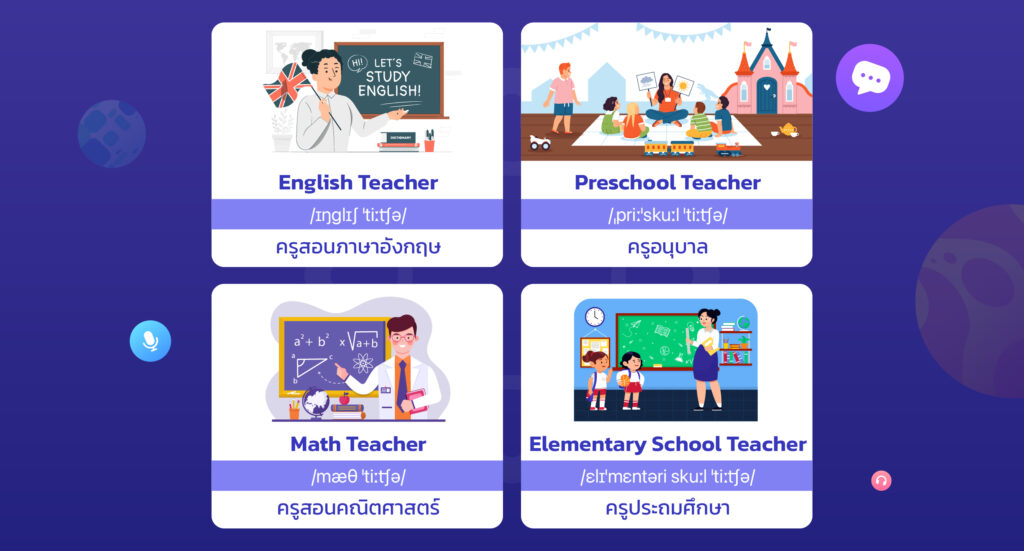
>>> Read more:
- ติวเตอร์ภาษาอังกฤษ AI ELSA Speak ช่วยให้คุณสามารถสื่อสารกับเจ้าของภาษาได้
- เทคนิคการเรียนภาษาอังกฤษออนไลน์ที่มีประสิทธิภาพที่สุดกับ ELSA Speak
ตัวอย่างประโยคภาษาอังกฤษเกี่ยวกับครู
- The English teacher always encourages her students to read widely and write creatively. (ครูสอนภาษาอังกฤษสนับสนุนให้นักเรียนอ่านหนังสืออย่างหลากหลายและเขียนอย่างสร้างสรรค์เสมอ)
- The science teacher conducts fascinating experiments to make learning fun and engaging for the students. (ครูวิทยาศาสตร์ทำการทดลองที่น่าสนใจ เพื่อทำให้นักเรียนมีส่วนร่วมในการเรียนรู้และมีความสนุกสนาน)
- The math teacher patiently explains complex problems until every student understands the concepts. (ครูคณิตศาสตร์พยายามอธิบายปัญหาที่ซับซ้อนอย่างใจเย็นจนกว่านักเรียนทุกคนจะเข้าใจ)
- The art teacher inspires creativity and imagination in her students through various projects and techniques. (ครูศิลปะสร้างแรงบันดาลใจให้กับความคิดสร้างสรรค์และจินตนาการในตัวนักเรียนผ่านโครงงานและเทคนิคต่างๆ)
- The history teacher brings the past to life with captivating stories and interactive lessons. (ครูสอนประวัติศาสตร์นำอดีตมาสู่ชีวิตจริงด้วยเรื่องราวที่น่าสนใจและบทเรียนแบบโต้ตอบ)
- The music teacher’s passion for music ignites a love for melodies and rhythms in the hearts of the students. (ความหลงใหลในดนตรีของครูสอนดนตรีจุดประกายความรักในทำนองและจังหวะในใจของนักเรียน)
- The physical education teacher motivates students to stay active and lead a healthy lifestyle through sports and exercises. (ครูพลศึกษากระตุ้นให้นักเรียนกระตือรือร้นและมีวิถีชีวิตที่มีสุขภาพดีผ่านการเล่นกีฬาและการออกกำลังกาย)
- The computer science teacher introduces students to the world of coding and technology, preparing them for the digital age. (ครูวิทยาการคอมพิวเตอร์แนะนำให้นักเรียนรู้จักกับโลกแห่งการเขียนโปรแกรมและเทคโนโลยี เพื่อเตรียมความพร้อมสำหรับยุคดิจิทัล)
- The school counselor provides support and guidance to students, helping them navigate challenges and make informed decisions. (ที่ปรึกษาคือผู้ที่ให้การสนับสนุนและชี้แนะนักเรียน ช่วยให้พวกเขาเอาชนะความยากลำบากและตัดสินใจได้อย่างถูกต้อง)
- The principal leads with integrity and vision, creating a positive and nurturing environment for both students and teachers. (อาจารย์ใหญ่เป็นผู้นำด้วยความซื่อสัตย์และมีวิสัยทัศน์ เพื่อสร้างสภาพแวดล้อมเชิงบวกและเอื้อเฟื้อสำหรับทั้งนักเรียนและอาจารย์ท่านอื่นๆ )

คำถามที่พบบ่อย
ครูภาษาอังกฤษเขียนยังไง?
ครูภาษาอังกฤษเขียนว่า “English teacher“
ไหว้ครูภาษาอังกฤษ คืออะไร?
ไหว้ครูภาษาอังกฤษ คือ Teacher’s Day celebration
ครู ภาษาอังกฤษ ย่อ คืออะไร?
ครู ภาษาอังกฤษ ย่อ “teacher” หรือย่อกว่าคือ “Tchr.” (ในเอกสารราชการจะไม่ใช้คำย่อนี้)
>>> Read more: คำอวยพรวันเกิดภาษาอังกฤษอย่างจริงใจสำหรับอาจารย์
บทความข้างต้นได้รวบรวมคำศัพท์และตัวอย่างประโยคที่พบบ่อยที่สุดเกี่ยวกับครูภาษาอังกฤษ หวังว่าจะช่วยให้ผู้เรียนนำคำศัพท์ไปฝึกใช้ในทักษะการสื่อสารมากขึ้น แล้วอย่าลืมมาอ่านบทความเกี่ยวกับการสื่อสาร คำศัพท์ และบทสนทนาของ ELSA Speak ในอนาคตกันอีกนะ
ทักษะ Speaking (การพูด) เป็น 1 ใน 4 ทักษะของ IELTS ซึ่งแบ่งเป็น 3 ระดับความยากและหัวข้อที่แตกต่างกัน จากนั้นคณะกรรมการจะประเมิณความสามารถในการพูดของคุณ มาสำรวจคำถามที่มักจะเจอในข้อสอบ IELTS Speaking Part 1 2 3 และเคล็ดลับการตอบคำถามที่มีประสิทธิภาพกับ ELSA Speak ด้านล่างนี้กันนะ
โครงสร้างข้อสอบ IELTS Speaking
โครงสร้างการสอบ IELTS Speaking มี 3 ส่วน (3 บท) ในแต่ละส่วนมีโครงสร้างที่แตกต่างกันแต่เป้าหมายทั้งหมดคือประเมินความสามารถของผู้สอบในการสื่อสารและแสดงความคิดเห็นโดยการพูดเป็นภาษาอังกฤษเกี่ยวกับหัวข้อเฉพาะ
| ส่วนที่สอบ | เวลาและข้อกำหนดเฉพาะสำหรับแต่ละส่วน |
| Part 1 (Introduction and Interview) | เวลา 4 ถึง 5 นาทีเนื้อหาและข้อกำหนด การทดสอบส่วนแรกกำหนดให้ผู้เข้าสอบตอบคำถามสั้นๆ เกี่ยวกับหัวข้อที่คุ้นเคยในชีวิตประจำวัน เช่น บ้านเกิด อาชีพ ที่พักอาศัย งานอดิเรก ครอบครัว |
| Part 2 (Long turn) | เวลา ผู้เข้าสอบมีเวลา 1 นาทีสำหรับการเตรียมตัวและ 2 นาทีในการนำเสนอเนื้อหาและข้อกำหนด ในส่วนนี้ผู้เข้าสอบจะได้รับกระดาษแผ่นเล็กๆ ที่มีหัวข้อและคำถามแนะนำ เพื่อช่วยให้ผู้เข้าสอบค้นหาแนวคิดเกี่ยวกับหัวข้อเฉพาะ ซึ่งโดยทั่วไปจะอธิบายถึงบุคคล วัตถุ สถานที่ หรือเหตุการณ์ หลังจากการนำเสนอ 2 นาที คณะกรรมการสามารถถามคำถามเพิ่มเติมเกี่ยวกับเนื้อหาคำตอบของผู้เข้าสอบได้ |
| Part 3 (Discussion) | เวลา 4 ถึง 5 นาทีเนื้อหาและข้อกำหนด ผู้เข้าสอบจะถูกถามคำถามหลายข้อที่เกี่ยวข้องกับหัวข้อในส่วนที่ 2 อย่างไรก็ตาม คำถามเหล่านี้มักจะมีลักษณะเป็นนามธรรมมากกว่าและต้องการให้ผู้เข้าสอบมีความรู้ที่หลากหลายเกี่ยวกับสังคมเพื่อหารือและเปิดกว้างเกี่ยวกับปัญหา |
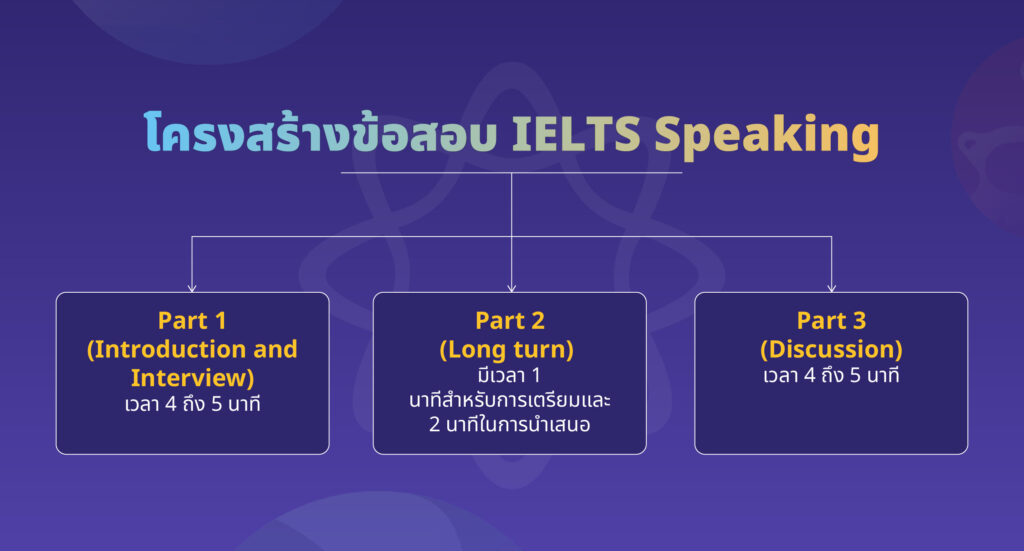
เกณฑ์การให้คะแนนของการสอบ IELTS Speaking
วิธีการให้คะแนนสำหรับการสอบ Speaking จะเหมือนกันทั้งประเภท Academic และ General เวลาในการสอบโดยประมาณ 15-20 นาที คณะกรรมการจะประเมินผลงานของผู้สอบตามเกณฑ์ 4 ประการต่อไปนี้
- Fluency and Coherence (ความคล่องแคล่วและการเชื่อมโยงกัน) เกณฑ์ในการประเมินความคล่องแคล่วในการพูดและการเชื่อมโยงแนวคิดในการทดสอบ ขณะเดียวกัน เกณฑ์กำหนดให้ต้องรักษาความยาวที่เหมาะสมสำหรับแต่ละส่วนและตอบคำถามที่เน้นตรงประเด็น
- Lexical Resource (ความสามารถในการใช้คำ) เกณฑ์การประเมินระดับการใช้คำศัพท์ที่หลากหลายในหัวข้อต่างๆ รวมกันอย่างถูกต้องและอยู่ในบริบทที่ถูกต้อง
- Grammatical Range and Accuracy (ไวยากรณ์มีความหลากหลายและแม่นยำ) เกณฑ์ในการประเมินความสามารถในการรวมโครงสร้างไวยากรณ์ต่างๆ ได้อย่างยืดหยุ่นและแม่นยำ
- Pronunciation (ออกเสียง) เกณฑ์การประเมินทักษะการออกเสียง น้ำเสียง ความเร็วในการพูด และความสามารถในการนำเสนออย่างชัดเจนและเข้าใจได้
แต่ละเกณฑ์ข้างต้นจะได้รับคะแนนตั้งแต่ 0 ถึง 9 และนำมารวมกัน จากนั้น คณะกรรมการจะใช้ค่าเฉลี่ยเพื่อให้ได้คะแนนสุดท้ายของการสอบ IELTS Speaking
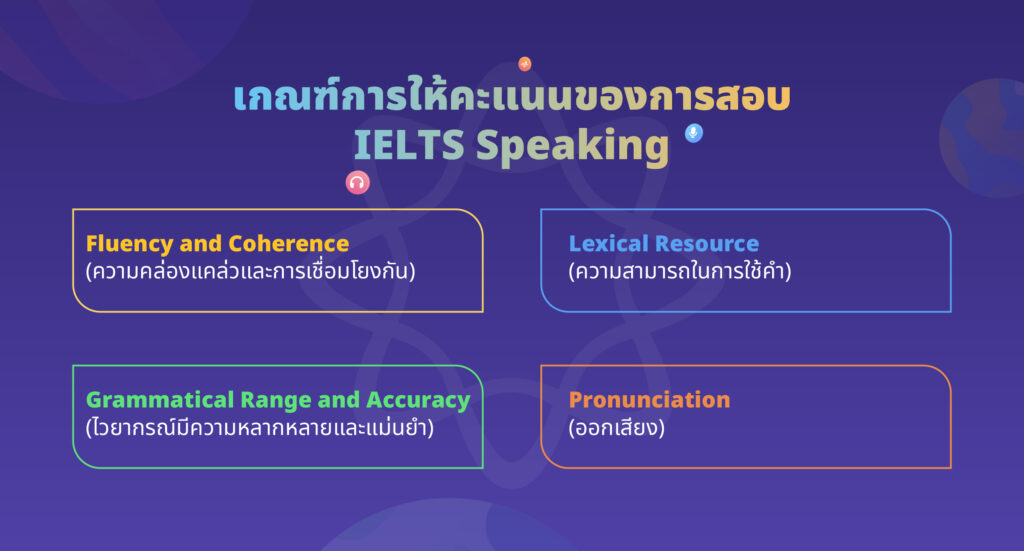
>>> Read more:
- สอบ IELTS ที่ไหนดี เรื่องที่คุณควรรู้เกี่ยวกับการสอบ IELTS
- IELTS SCORE – วิธีคำนวณคะแนนและเกณฑ์การให้คะแนนสำหรับทั้ง 4 ทักษะ
วิเคราะห์ตัวอย่าง IELTS Speaking Part 1 2 3 ตามหัวข้อทั่วไป
ตัวอย่างคำถาม IELTS Speaking Part 1 ตามหัวข้อ
ในส่วนที่ 1 คณะกรรมการจะให้ผู้สอบแนะนำชื่อและแสดงบัตรประจำตัวของคุณ แล้วจะถูกถามคำถามทั่วไปเกี่ยวกับตัวคุณเอง เช่น คุณอาศัยอยู่ที่ไหนหรือกำลังทำอะไรอยู่ (ทำงานหรือเรียนอยู่)
หลังจากนั้น คุณจะได้รับการถามคำถามบางคำเกี่ยวกับหัวข้อที่คุ้นเคย อย่างเช่น ประเภทเพลงที่คุณชอบ การทำอาหาร อากาศหรือภาพยนตร์ที่คุณชื่นชอบ ปกติแล้วคุณจะถูกถามหนึ่งหรือสองหัวข้อ คณะกรรมการจะถามคำถามจากสคริปต์และฟังคำตอบของคุณ โดยขอให้คุณขยายคำตอบด้วยคำถาม เช่น “ทำไม” หรือ “ทำไมจะไม่ได้?” ถ้าคำตอบของคุณสั้นเกินไป
การทดสอบส่วนนี้เป็นไปตามรูปแบบคำถามและคำตอบ โดยเน้นไปที่ความสามารถของคุณในการสื่อสารแนวคิดและข้อมูลเกี่ยวกับหัวข้อในชีวิตประจำวันโดยการตอบคำถามหลากหลายข้อ
ด้านล่างนี้คือตัวอย่างคำถาม IELTS Speaking Part 1 ตามหัวข้อเพื่อให้คุณอ้างอิง
| หัวข้อ | คำถาม |
| Accommodation & Hometown | Let’s talk about your hometown. • Where is your hometown? • What do you like about it? • What do you not like about it? • How important is your hometown to you? • Do you think you will continue to live in your hometown? Let’s move on to talk about accommodation. • Tell me about the kind of accommodation you live in? • Does the place you live in have many amenities? • Is there anything you would like to change about the place you live in? • Do you plan to live there for a long time? • Do you live in a house or a flat? • Is it a big place? • How long have you lived there? • What do you like about living there? •Is there a garden in the place you live in? |
| Hometown & Weather | • What is your country famous for? • Where do you live in your country? • Is it an interesting place to live? • Are you planning to live there in the future? • How is the weather today? • What’s your favorite kind of weather? • Is there any type of weather you really don’t like? • What is the climate like in your country? • Does the weather affect people’s lives in your country? • Do people change in the summer? • Does bad weather ever affect transport in your country? • Tell me about the weather in your country at different times of the year? • Which time of the year did you enjoy the most when you were a child? • Do you (usually) pay attention to the weather forecasts? • Has the weather changed much in your country in recent years? |
| Work | • Do you have a job right now? • Do you enjoy your job? • What responsibilities do you have at work? • What is your typical day like at work? • What would you change about your job? • What job do you think you will be doing in five years? • What skills and qualifications are required for this job? • Do you work or study? • Do you get on well with your co-workers? • Are there good work opportunities in your home country? |
| Volunteer Works | • Have you ever worked before? • What was your first day at work like? • What responsibilities did you have at work? • What was your typical day like at work? • Have you done any volunteer work? • Why did you do the volunteer work? • Do you know any volunteers? • How do you define volunteer work? |
| Family & Housework | • How many people are there in your immediate family? • Who do you get on best within your family? • Do you have a large extended family? • What do you do together with your family? • Why is family important to you? • Do you do housework at home? • What kind of housework do you often do? • Did you do housework when you were a child? • Do you think that children should do housework? |
| Books & TV | • Do you like watching TV? • How often do you watch TV? • What kind of TV programmes do you like to watch? • What are the most popular TV shows in your country? • Has the internet affected your viewing habits? • How often do you read? • Do you like reading books? Why? • Do you have many books at home? • Do you prefer to buy books or borrow them?What are the benefits of reading? |
| Celebrity & Computer | • Do you use computers? • What do you use a computer to do? • Did you use computers when you were little? • Do people often use computers these days? • Will people continue to use computers in the future? • Who is your favorite celebrity? • Do you like any foreign celebrities? • Would you want to be a celebrity in the future? • Do you think we should protect famous people’s privacy? • How do celebrities influence their fans in your country? |
| Movies & Music | • How often do you go to the cinema? • Are cinema tickets expensive in your country? • What are the advantages of seeing a film at the cinema? • Do you usually watch films alone or with others? • Which actor would you like to play you in a film? • How do you listen to music? • When do you listen to music? • What’s your favorite kind of music? • Is music an important subject at school in your country? • What kinds of music are (most) popular in your country? |
| Music & Newspaper and Magazine | • What’s your favorite kind of music? • Do you like to listen to live music? • Is live music popular in your country? • Have you ever been to a concert before? Or Have you ever been to a musical performance? • Do you often read newspapers? • Do you prefer to read local news or international news? • Which is more popular where you live, newspapers or magazines? • Do many people today read newspapers? • In the future, do you think more people than today will read magazines, or fewer people? • Do you think newspapers will be very important to you in the future? |
| Music & Travel | • Where was the last place you visited on holiday? • Would you like to go back there again? • What kind of tourist destinations do you usually prefer? • Has a foreign visitor ever stayed at your home? • What’s the best way to save money while traveling? • How much time do you spend listening to music every day? • Are your music tastes varied? • What is your favorite song? • Do you like to sing along to your favorite songs? • Are you learning to play a musical instrument at the moment? |
| Internet & Major | • How important is the Internet to you? • Do you use the Internet more for work or in your free time? • Do you think you use the Internet too much? • How will the Internet develop in the future? • Are there any negative things about the Internet? • What is your major? Or what was your major? • Did you or do you like it? • Is it a popular major at your university? • If you could change to another major, what would it be? • Would you change it if you had the chance? |
| Internet & Outdoor Activities | • Do you like outdoor activities? • What outdoor sports do you like? • How much time do you spend outdoors every week? • What types of outdoor activities are popular in your country? • How often do you use the Internet? • Do you think you use the Internet too much? • What are your favorite websites? • What are the positive and negative things about the Internet? |
| Indoor Activities & Transportation | • Do you prefer public transportation or private transportation? • What’s the most popular means of transportation in your hometown? • Is it easy to catch a bus in your country? • Is driving to work popular in your country? • What do you think will become the most popular means of transportation in your country? • Do you like indoor activities? • What indoor activities do you like? • How much time do you spend indoors every week? • What types of indoor activities are popular in your country? |
| Major & Sports | • Do you work or study? • What is your major? Or what was your major? • Why did you choose that major? • What is the most difficult part of studying that subject? • Do you plan to use the subject you are studying in the future? • Do you play any sports? • Do you watch sports on TV? • What is the most popular sport in your country? • How do people in your country stay fit? • Is it important for children to play sports? |
| Gift & Noise | • Do you mind noises? • What types of noise do you come across in your daily life? • Are there any sounds that you like? • Where can you hear loud noises? • Do you think there’s too much noise in modern society? • Are cities becoming noisier? • When do you send gifts? • When was the last time you received a gift? • Have you received a gift you didn’t like? • How do you feel when you receive a gift? • Do people in your country send gifts to show their generosity? |
| Patience & Politeness | • What do you think patience is? • Do you think patience is important? • Do you think you are a patient person? • Have you ever lost your patience? • Are you a polite person? • Who taught you to be polite? • Is it important to be polite? • What do you do if others are not polite to you? |
| Colors & Weather | • What’s the best season of the whole year? • What do people normally do in that season? • What’s the weather usually like in your country (or, your hometown)? • How is the weather here different from the weather in your home country? • What colors do you like? • What’s the most popular color in your country? • Do you like to wear dark or bright colors? • What’s the difference between men and women’s preference for colors? • Do colors affect your mood? |
| Food & Weather | • Do you have a healthy diet? • Do you prefer eating at home or eating out? • Do you like ordering food to be delivered? • Who do you get food delivered with? • Do you eat meals differently now compared to when you were little? • What sort of weather do you like the most? • Would you say the weather in your hometown is suitable for working (or studying)? • Would you like to move to a place with different weather? • What season (or weather) do you think is most suitable for work and/or study? |
| Clothes & Photos | • What is your favorite item of clothing? • Are there any traditional clothes in your country? • Where do you usually purchase your clothes? • Have you ever bought clothes online? • Who do you usually take photos of? • How do you keep your photos? • Do you keep your photographs on your computer? • Have you framed any of your photos? • Do you prefer to send postcards to people or to send photos that you took yourself? |
| Art & Photography | • Do you like art? • Do you think art classes are necessary? • How do you think art classes affect children’s development? • What kind of paintings do people in your country like? • What benefits can you get from painting as a hobby? • Do you like to take photographs? • Do you prefer to take photos yourself or to have other people take photos? • How often do you take photographs? • Do you prefer to take pictures of people or of scenery? • Are there any photos on the walls of your home? |
| Bags & Boat | • Have you ever taken a ride on a boat? • Do you like traveling by boat? • What are the advantages of traveling by boat? • Do people in your country like to travel by boat? • Will it get more popular in the future? • Do you like bags? • What types of bags do you like? • Do you usually carry a bag (when you go out)? • What types of bags do you use in your everyday life? • What do you put in these bags? • What sorts of bags do women like to buy? |
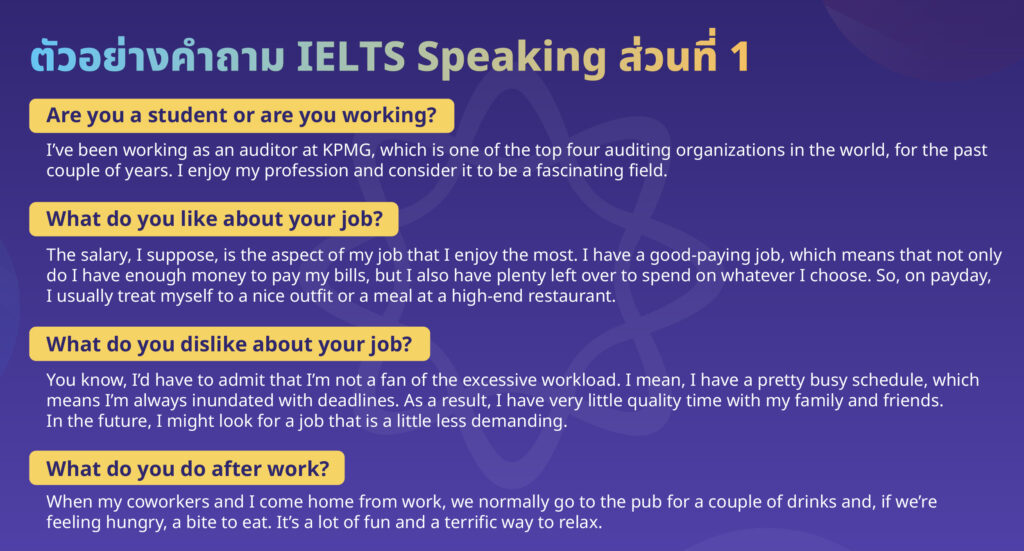
ตัวอย่างคำถาม IELTS Speaking Part 2 ตามหัวข้อ
หลังจากจบ IELTS Speaking ส่วนที่ 1 แล้ว คณะกรรมการจะเสนอหัวข้อและคุณจะต้องพูดเกี่ยวกับเรื่องนี้ประมาณหนึ่งถึงสองนาที หัวข้อจะถูกเขียนลงบนการ์ด และคุณจะได้รับกระดาษและดินสอสำหรับจดบันทึกด้วย บนการ์ด คุณจะเห็นคำแนะนำในการพูดและประเด็นที่คุณสามารถพูดถึงในการบรรยายเกี่ยวกับหัวข้อนั้นได้
คุณจะมีเวลาหนึ่งนาทีในการเตรียมตัวและจดบันทึกก่อนที่จะเริ่มพูด คณะกรรมการจะใช้เครื่องจับเวลาและแจ้งให้คุณทราบเมื่อหมดเวลาเตรียมตัว และแจ้งให้คุณทราบเมื่อถึงเวลาเริ่มพูด รวมถึงเตือนคุณว่าจะเริ่มสอบ IELTS Speaking ภายใน 2 นาที คะแนนบนการ์ดจะช่วยให้คุณคิดว่าจะพูดอะไร และคุณควรพยายามพูดอย่างต่อเนื่องเป็นเวลา 2 นาที พวกเขาอาจถามคำถามเกี่ยวกับสิ่งที่คุณพูดก่อนที่จะไปยังส่วนต่อไป
| หัวข้อ | คำถาม |
| Advertisements | Describe an advertisement that persuaded you to buy a product. |
| Art | Talk about a painting you would like to have in your home. |
| Books | Talk about a book you are reading now or have read recently. |
| Talk about a book you have never read but would like to read. | |
| Business | Describe a small business you want to start. |
| Change | Describe a positive change in your life. |
| City | Describe your favorite city or a city you have visited that you like very much. |
| Company | Describe an organization or a company that you know. |
| Electronic devices | Describe a useful electronic device you would like to own. Describe a piece of electronic equipment that you have. Describe a piece of electronic equipment that you find useful. |
| Environment | Describe an environmental problem or event. |
| Exciting experience | Describe an exciting experience you’ve had. |
| Family | Talk about the last time your whole family got together. Describe a family member that you get on well with. Describe one of your relatives. |
| Food | Describe a famous food from your hometown or country. |
| Friends | Describe a friend who has played an important part in your life. Describe a friend you had in primary school. |
| Clothes | Describe your favorite piece of clothing. |
| Furniture | Describe a piece of furniture that you own. |
| Gifts | Describe a present that you gave someone. |
| Health | Describe your (or your friend’s) experience with an illness or injury. Describe something healthy you enjoy doing. |
| Help | Describe a time when you helped someone. |
| History | Describe a historical place that you have visited. |
| Holiday | Talk about an activity you like doing when you are on holiday. Talk about somewhere you went on holiday. Talk about your dream holiday. Talk about your plans for your next long vacation. |
| Influence | Describe someone who has had an important influence in your life. |
| Internet | Describe a website that you often use. |
| Language | Talk about one method of learning a foreign language you have used. Talk about an English language book you have read or used. Talk about a language test you have taken. |
| Late | Describe a time you were late for something. |
| Hobbies | Talk about a leisure activity you did when you were a child. |
| Machine | Describe the most useful household appliance that you have. |
| Memory | Describe an occasion when you forgot something important. |
| Money | Describe what you would do if you received a very large amount of money. |
| Music | Talk about a musical instrument you would like to be able to play but have never tried. |
| News | Describe an interesting piece of news that you have recently read about or heard about. |
| Parenting | Describe people that you know and believe to be very good parents. |
| Party | Describe the best party you have been to. Talk about a birthday party you can remember well. Describe a typical festival or celebration in your country. Describe your favorite festival or celebration. |
| Plans | Talk about one thing you are going to do next weekend. Talk about one thing you are planning to do after you pass the IELTS test. Talk about a goal or ambition you have. |
| Products | Describe something which is produced in your country. |
| Restaurants | Describe a restaurant or a cafe you often go to. |
| Rules | Describe a traffic rule or law you know about. Describe a rule you had to obey when you were in school. |
| School | Describe a school that you are attending or attended in the past. Talk about a subject you would like to study in the future. |
| Science | Describe an area of science that you are interested in. Describe a scientific subject that you learned about in high school. |
| Shopping | Describe a shopping street in your hometown. Describe a shop in your hometown or the place you are living now. |
| Social problems | Describe a problem in your city. |
| Sports | Talk about a sport you like doing or watching. Talk about a sport many people enjoy but you have never tried. Talk about a sport that interests you but you have never tried. |
| Teacher | Describe the best teacher you have had. |
| Things | Describe something you own which is very important to you. |
| Traditional products | Talk about a traditional product which is very popular in your country. |
| Transportation | Describe the transportation system in your hometown or the place you are living now. Talk about one means of transportation that you often use. |
| Travel | Describe a journey you have been on. Talk about something tourists like to do in your country. Talk about a day trip you have been on. Talk about a part of your country you have never been to but would like to visit. Talk about a foreign country you have never been to but would like to visit. |
| TV | Describe a TV programme that you often watch. |
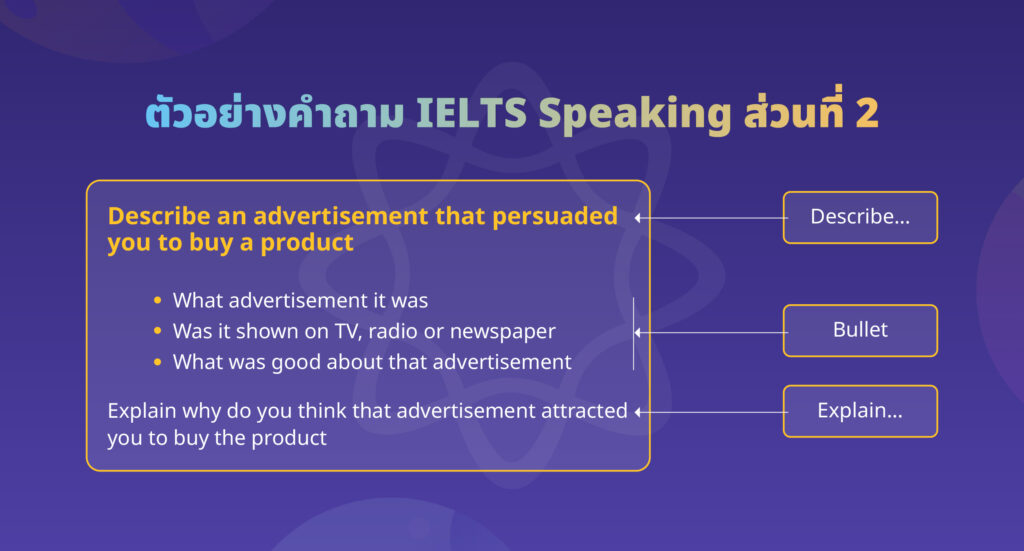
ตัวอย่างคำถาม IELTS Speaking Part 3 ตามหัวข้อ
คำถามใน IELTS Speaking Part 3 จะเกี่ยวข้องกับหัวข้อทั่วไปที่คุณพูดถึงในส่วนที่ 2 คุณจะอภิปรายหัวข้อในลักษณะทั่วไปและเป็นนามธรรมมากขึ้น แสดงให้คณะกรรมการเห็นว่าคุณสามารถแสดงและชี้แจงความคิดเห็น วิเคราะห์ อภิปราย และคาดเดาเกี่ยวกับหัวข้อนั้นๆได้อย่างครอบคลุมมากขึ้น
คณะกรรมการจะสื่อสารกับคุณมากขึ้นในส่วนนี้ และอาจขอให้คุณอธิบายแนวคิดของคุณเพื่อประเมินความสามารถในการสื่อสารเกี่ยวกับแนวคิดที่เป็นนามธรรม เทียบกับหัวข้อส่วนตัวที่คุณอภิปรายในส่วนที่ 1 และส่วนที่ 2
| หัวข้อ | คำถาม |
| Advertising | • What are popular types of advertising in today’s world? • What type of media advertising do you like most? • Do you think advertising influences what people buy? • What factors should be taken into account when making advertisements? • Is advertising really necessary in modern society? • How does advertising influence children? • Is there any advertising that can be harmful to children? • Do you think advertising influences what people buy? • Is advertising really necessary in modern society? |
| Art | • How do people in your country feel about art? • Do people in your country prefer music over art? • What are some traditional art forms in your country? • How has art changed in the past few decades in your country? • Do you think children should study art in school? • How can children benefit from learning about art? • Do you think the government should provide support for art and cultural activities? |
| Books | • Do people read more nowadays? • Do you read before going to bed? • In your opinion, how will e-books affect paper books? • What’s the difference between films and books? • What is one example of traditional literature in your country? • Do you like reading the traditional literature of your country? |
| Business | • In your opinion, do business people have to work long hours? • How do business people relax? • How can a small business grow big? • What kind of small businesses will young people have in the future? • What skills are required to start a small business? • What are the impacts of globalization on small and large businesses? |
| Change | • Do you think change is good? • What are some of the major changes that occur to people throughout their lives? • Is your country changing rapidly? • In what ways have changes in technology changed people’s lives? • Why do old people not accept change? |
| City | • In your opinion, what makes a city a good one to live in? • What are the advantages of living in a city? • What are the negative aspects of crowded cities? • How can governments improve living standards in crowded cities? • What can people do to improve the air quality in the city? |
| Company | • What is the difference between big companies and small companies? • Are there many big companies in your country? • What are the good things about working for a big company? • Should big companies be punished more seriously than small companies? • Why do some people choose to work at an international company? • How can a company maintain the quality of the service that it gives to the public? • Do you think it’s important for a company to provide after-sales service? |
| Decision | • Why do some people find it hard to make decisions? • How important is it to get advice from other people when making decisions? • Why is it sometimes difficult to accept advice? • What are some of the most important decisions young people have to make? • Do you agree that parents should make important decisions for their children? • Is it better to make a decision thinking about what you want or thinking about what other people want? |
| Electronic Devices | • What are the most popular electronic devices in today’s world? • What devices do you think will be popular in the future? • Do you think people spend too much money on electronic devices? • In what ways can electronic devices make our lives harder? • What would the world be like without computers? • Should children be taught to use computers at school? |
| Environment | • What are some of the main environmental problems in your country? • Why should people be concerned about the environment? • How can people protect the environment? • Do you think money should be spent on protecting animals? • Do you think more should be done to protect natural scenic spots in your country? • Is water pollution a problem in your country? • What can individuals do to try and ensure water is kept clean? • Do you think problems with the cleanliness of water will improve in the future? |
| Exciting Experiences | • Can you compare some exciting activities people do now with activities people did 20 years ago? • Why do some people enjoy doing dangerous sports? • Do you think some dangerous activities should be banned? • Should people try doing new things? • What problems can people have when they try new activities for the first time? • Do you think it’s best to do new things on your own or with other people? |
| Family | • Is family important in your country? • Who should be responsible to care for the elderly? Should it be the family or the government? • How has the size of the average family changed in your country in the last few decades? • How do you think families will change in the future? • Should husbands and wives have different roles within the family? • What role do grandparents play in the family in your country? |
| Food | • What are the types of food that people eat in your country? • What kinds of foreign food are popular in your country? • Is it important to have a meal together with your family? • Is food now better than in the past? • Do you think our diet is important? • What is a balanced diet? • How are the eating habits now in your country different from eating habits in the past? • How might eating habits change in the coming decades? |
| Friends | • What is the importance of friends? • Would you like to have a few very good friends or a lot of just friends? • If you had a problem, would you go to your friends or family? Why? • Is it always better to talk to your friends about such a problem? • Is it important to have friends from other countries? |
| Clothing | • Can clothing tell you much about a person in your country? • Do people still wear traditional clothing in your country? • How has clothing fashion changed in your country over the last few decades? • Why do some companies ask their staff to wear uniforms? • What are the advantages and disadvantages of having uniforms at work? • For which jobs are people required to wear a uniform in your country? • Do you think people are treated differently when they are in uniform? |
| Furniture | • In what situations do people in your country buy furniture? • In families in your country, who usually decides what furniture to buy for the home? • How do people in your country decide what furniture to buy for the home or office? • Do people in your country prefer traditional or modern styles of furniture? |
| Health | • How can people improve their health? • Do elderly people exercise much in your country? • Do you think all illnesses can be prevented? • Do you think that illnesses will be less common in the future? • Do you think healthcare should be free? • What makes someone a good doctor? |
| Helping Others | • Do you like helping others? • Do you think people are less willing to help others these days compared to the past? • Do people today trust others as much as they used to in the past? • How do people in your community help each other? • Should children be taught to help others? • How can we encourage children to help others? • How can students, such as high-school students, help each other? |
| History | • Do you think history is important? • Do you like to learn about history? • What do you think we can learn by studying history? • How can people learn about history? • Do you think people can learn history from films or TV programs? • Do you think the internet is a good place to learn about history? • What is the effect of technology on how people learn about history? |
| Holidays | • Why do people go on holiday? • How important is it for families to go on holiday together? • Why do some people go on holiday alone? • How have holidays changed over the past few decades? • What kind of holidays will be popular in the future? • Do you think it is better to take a holiday in your own country or in a foreign country? • What problems can people have on holiday in a foreign country? |
| Influence | • Why do people go on holiday? • How important is it for families to go on holiday together? • Why do some people go on holiday alone? • How have holidays changed over the past few decades? • What kind of holidays will be popular in the future? • Do you think it is better to take a holiday in your own country or in a foreign country? • What problems can people have on holiday in a foreign country? |
| Internet | • How do you think the Internet will change people’s buying habits in the future? • What are the pros and cons of shopping online? • Is the Internet important for education? • Do you think parents should supervise their children’s use of the Internet? • What’s the best way to ensure online safety? |
| Occupation | • What kind of jobs are popular in your country? • What qualities do people need to do well in their job? • Do you think people should choose a job based on salary or personal interest? • How can a company help employees improve their skills? • Do you think young people are interested in becoming entrepreneurs? |
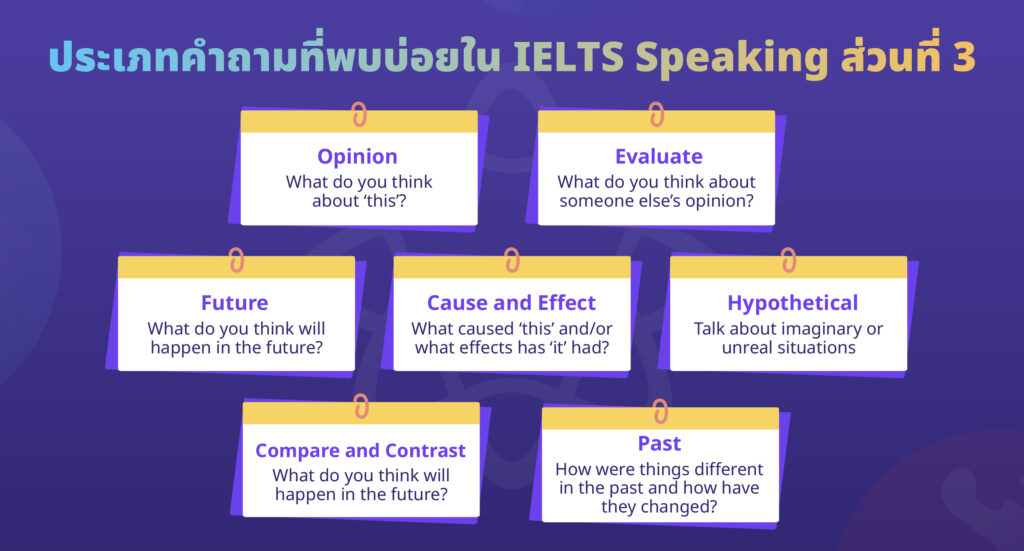
เคล็ดลับการทำแบบทดสอบ IELTS Speaking เพื่อให้ได้คะแนนสูง
ต่อไปนี้เป็นเคล็ดลับในการทำแบบทดสอบ IELTS Speaking เพื่อช่วยให้คุณได้คะแนนสูง
- อ่านคำถามอย่างละเอียด กำหนดข้อกำหนดหลัก มุ่งเน้นไปที่คำถาม หลีกเลี่ยงการฟังสั้นๆ และไม่มีคำหลัก เพราะนี่คือปัจจัยหลักที่ช่วยให้คุณกำหนดความต้องการของคำถามได้ จึงจะตอบคำตอบที่ตรงประเด็นโดยไม่นอกประเด็น
- อย่าตอบสั้นหรือยาวเกินไป หากคุณให้คำตอบที่สั้นเกินไป คณะกรรมการจะไม่มีทางรู้ได้ว่าคุณเก่งแค่ไหน ดังนั้นคุณควรพยายามขยายคำตอบของคุณด้วยคำอธิบายและยกตัวอย่าง ในขณะเดียวกัน สำหรับการตอบแบบยาว หลายๆ คนมักคิดว่ายิ่งตอบนานเท่าไรก็ยิ่งได้คะแนนสูงเท่านั้น อย่างไรก็ตาม สิ่งนี้ใช้ได้กับผู้สมัครที่มีความสามารถด้านการพูดที่ดีเท่านั้น ส่วนใครที่พูดภาษาอังกฤษไม่เก่งหรือขาดความมั่นใจการพูดนานๆบางครั้งก็ผิดพลาดได้ง่าย
- ใช้ประโยคที่หลากหลายและคำศัพท์ที่กว้างออกไป ผสมผสานประโยคง่ายๆ ประโยครวม ประโยคที่ซับซ้อน ฯลฯ หลายประเภทได้อย่างยืดหยุ่น ขณะเดียวกันการใช้คำศัพท์ขั้นสูง คำพ้องความหมาย ฯลฯ จะช่วยให้คะแนนการทดสอบของคุณสูงขึ้นด้วย
- เน้นน้ำเสียงเพื่อสร้างแรงดึงดูด ผู้สมัครหลายคนมักจะเน้นแค่ไวยากรณ์ แต่ลืมไปว่าน้ำเสียงก็มีส่วนสำคัญในการช่วยให้คะแนนสอบของคุณดีขึ้น เมื่อนำเสนอให้ใช้สำเนียงที่มั่นใจ เปลี่ยนน้ำเสียง ฯลฯ ซึ่งจะทำให้ดูน่าดึงดูดและเรียกความสนใจจากผู้ฟังมากขึ้น
- ไม่ต้องท่องจำ พูดอย่างเป็นธรรมชาติ การท่องจำเป็นกลยุทธ์ที่ผู้สอบหลายคนใช้เพื่อประหยัดเวลาและไม่ต้องคิดระหว่างทำข้อสอบ อย่างไรก็ตาม ความกดดันและความวิตกกังวลในห้องสอบจะทำให้คุณจำทุกสิ่งที่คุณท่องมาไม่ได้ ทำให้การพูดของคุณลังเลและไม่เป็นธรรมชาติ และกรรมการจะสังเกตเห็นได้ง่ายด้วย
- อย่าพูดเร็วเกินไป ใจเย็นๆ ตอบอย่างมั่นใจ ความวิตกกังวลและความรู้สึกไม่สบายที่มากขึ้นจะทำให้คุณพูดติด ๆ ขัด ๆ และขาดการเชื่อมโยงระหว่างส่วนต่าง ๆ ของการทดสอบพยายามเรียนรู้วิธีควบคุมอารมณ์ของคุณ อย่ากังวลมากเกินไปหากคุณตอบผิดโดยไม่ตั้งใจ แต่ให้สงบสติอารมณ์และมั่นใจเพื่อทำส่วนถัดไปให้เสร็จสิ้นให้ดีแทน
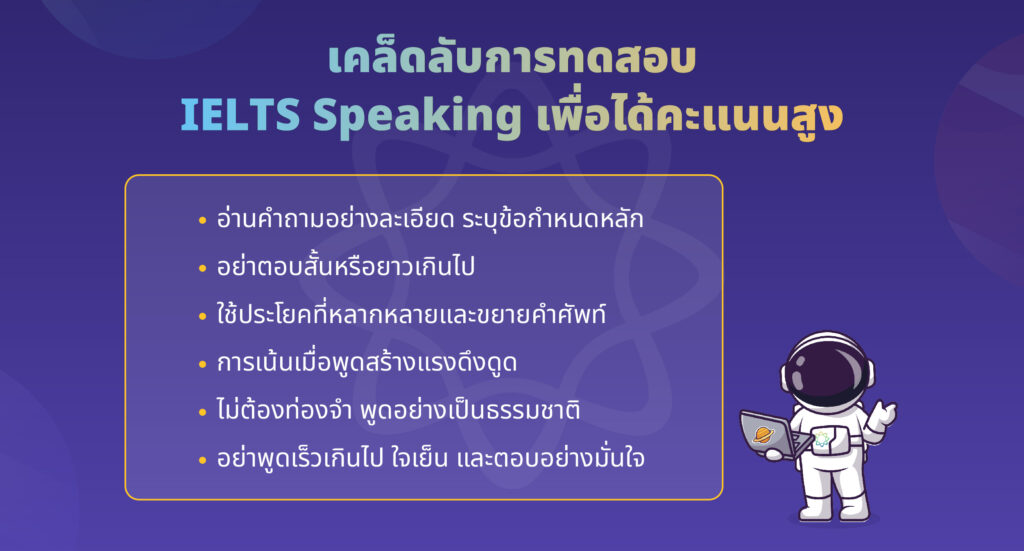
ฝึกฝน IELTS Speaking อย่างไร
หากต้องการฝึกพูด IELTS คุณสามารถดูวิธีการต่อไปนี้
- ค้นหาเพื่อน หัวใจหลักของการฝึกพูดที่มีประสิทธิภาพคือการสื่อสาร ดังนั้นคุณจึงต้องหาเพื่อนร่วมทางที่จะ “ก้าวไปด้วยกัน” บนเส้นทางการฝึกการถามตอบแบบโต้ตอบกลับเป็นภาษาอังกฤษ เพื่อนจะช่วยให้กระบวนการฝึกฝนของคุณสมจริงและมั่นใจยิ่งขึ้น ช่วยให้สมองของคุณดูดซับและสร้างปฏิกิริยาตอบสนองได้รวดเร็วยิ่งขึ้น นอกจากนี้ เพื่อนของคุณยังช่วยให้คุณตรวจจับและแก้ไขข้อผิดพลาดในการออกเสียงและการสื่อสารได้ทันที
- เสริมสร้างไวยากรณ์และเพิ่มคำศัพท์ การฝึกคำศัพท์และไวยากรณ์เป็นวิธีหนึ่งในการฝึก IELTS Speaking ที่บ้านที่คุณต้องให้ความสำคัญ นอกจากจะเข้าใจความหมายของคำแล้ว ยังต้องรู้บริบทการใช้และประเภทของคำนามเพื่อใช้ประโยคที่ถูกต้องด้วย เช่นเดียวกับประโยค คุณต้องฝึกพูดโดยใช้โครงสร้างประโยคมาตรฐานเต็มรูปแบบ เนื่องจาก IELTS ไม่ใช่การสื่อสารภาษาอังกฤษทั่วไป แต่มีข้อกำหนดทางวิชาการมากกว่า
- การออกเสียงและน้ำเสียงที่ถูกต้อง หนึ่งในเกณฑ์สำคัญในการประเมินการทดสอบการพูดคือการออกเสียง ด้วยการออกเสียงที่ถูกต้องเท่านั้นคุณจึงจะสามารถถ่ายทอดความคิดของคุณให้คณะกรรมการได้ นอกจากการออกเสียงแล้ว น้ำเสียงยังทำให้ภาษาอังกฤษของคุณเป็นธรรมชาติ นุ่มนวล และมีชีวิตชีวามากขึ้นอีกด้วย เพื่อฝึกการออกเสียงภาษาอังกฤษอย่างรวดเร็วและมีประสิทธิภาพ คุณสามารถดาวน์โหลดแอป ELSA Speak เพื่อฝึกฝนได้ทุกวัน

หนังสือเตรียมสอบ IELTS Speaking ที่ดีที่สุด 4 อันดับแรก
Understanding Vocab for IELTS Speaking 2nd Edition
หนังสือรวบรวมคำศัพท์และวลีดี ๆ เกี่ยวกับ 16 หัวข้อทั่วไปในการสอบ IELTS ในช่วง 2 ปีที่ผ่านมา (2022 และ 2023) Study, Work, Accommodation,The Internet, Technology, Tourism, Culture and Travel, Food, Places, Personality, Relationships, Decisions, Feelings, Shopping, Money.
Collins Speaking for IELTS
สำหรับผู้สมัครที่เพิ่งเริ่มทำความคุ้นเคยกับการสอบ IELTS Speaking Collins Speaking for IELTS เป็นหนึ่งในตัวเลือกที่ควรพิจารณา เนื่องจากเนื้อหาของหนังสือนำเสนออย่างเป็นวิทยาศาสตร์ โดยมีทั้งหมด 12 หน่วยพร้อมแบบทดสอบสั้นๆ คำถาม และหัวข้อต่างๆ ที่เกี่ยวข้องกับส่วนของการสอบ IELTS Speaking
นอกจากนี้ หนังสือเล่มนี้ยังให้คำแนะนำและกลยุทธ์ที่เป็นประโยชน์แก่ผู้อ่าน ช่วยให้พวกเขาพัฒนาทักษะการพูดได้อย่างรวดเร็ว
31 High-Scoring Formulas To Answer The IELTS Speaking Questions
สำหรับผู้สมัครที่ต้องการพัฒนาทักษะในการตอบคำถามในการสอบ IELTS Speaking เอกสารนี้เป็นสิ่งที่ขาดไม่ได้ เนื่องจากมีสูตรคำตอบที่แตกต่างกันถึง 31 สูตรให้ผู้เรียนใช้ในการแก้คำถามประเภททั่วไปที่พบในการสอบ IELTS Speaking ในเล่ม 31 High-Scoring Formulas To Answer The IELTS Speaking Question จะมีการยกตัวอย่างและอธิบายโดยละเอียด เพื่อช่วยให้ผู้สมัครนำไปประยุกต์ใช้ในทางปฏิบัติได้อย่างง่ายดาย
Basic IELTS Speaking
Basic IELTS Speaking เป็นสื่อการเตรียมสอบการพูดที่มีประโยชน์อย่างยิ่งสำหรับผู้เริ่มต้นโดยผู้เขียน Zhang Juan หนังสือทั้งเล่มประกอบด้วย 10 บท โดยแต่ละบทจะเน้นไปที่หัวข้อที่แตกต่างกัน ช่วยให้ผู้เรียนพัฒนาทักษะพื้นฐานในด้านคำศัพท์ ไวยากรณ์ การออกเสียง และโดยเฉพาะอย่างยิ่งการให้คำแนะนำและแนวคิดแก่ผู้เรียนเพื่อช่วยให้พวกเขาตอบคำถามได้อย่างถูกต้องและมั่นใจมากขึ้นในการสอบ IELTS Speaking
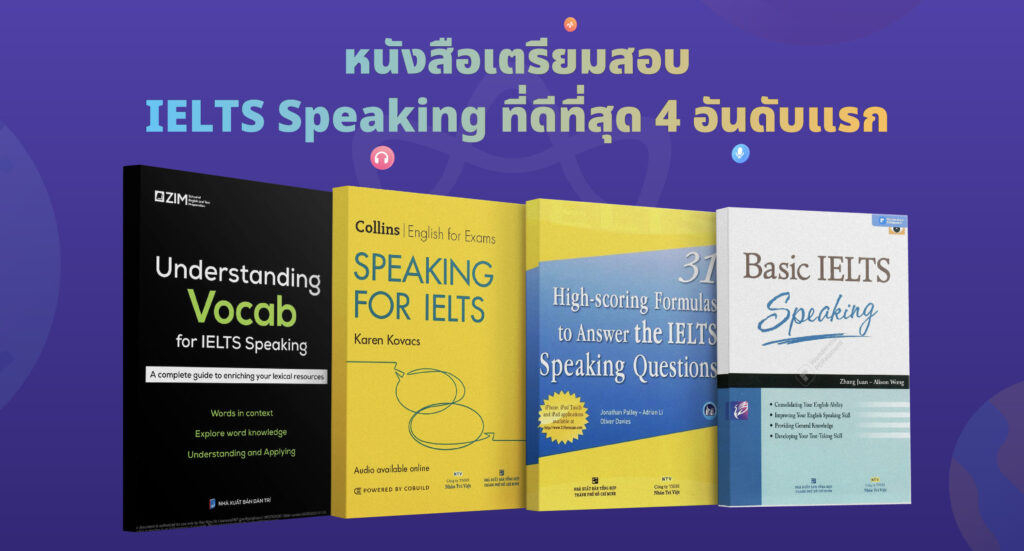
>>> Read more: [รวบรวม] 5,000 + คำศัพท์ IELTS ตามหัวข้อที่พบบ่อยที่สุด
ข้างต้นคือคำถามและเคล็ดลับทั้งหมดสำหรับการสอบ IELTS Speaking เพื่อให้ได้คะแนนสูง หวังว่าการแบ่งปันข้างต้นจะช่วยให้คุณสอบ IELTS ได้อย่างมีประสิทธิภาพ นอกจากนี้อย่าลืมเข้าชมและติดตาม ELSA Speak เป็นประจำเพื่ออัปเดทความรู้ IELTS ล่าสุดทุกวันนะ
โครงสร้าง have somebody do something เป็นโครงสร้างที่ใช้บ่อยในการขอให้ใครสักคนทำบางสิ่งบางอย่างให้ แล้วเราจะใช้โครงสร้างนี้อย่างไร? และมีความแตกต่างอย่างไรระหว่าง have somebody do something กับ have somebody doing something? มาดูรายละเอียดกับ ELSA Speak ด้านล่างนี้กันเลย!
Have someone do something คืออะไร?
โครงสร้าง “have someone do something” ในภาษาอังกฤษหมายถึง “ขอให้ใครสักคนทำอะไรบางอย่างให้” โครงสร้างนี้ใช้เพื่อบ่งบอกถึงกรณีที่ประธาน ร้องขอ มอบหมาย หรือจัดการให้ผู้อื่นทำบางสิ่งบางอย่าง
ตัวอย่าง:
- I have my sister clean my room. (ฉันขอให้น้องสาวมาทำความสะอาดห้องให้)
- She had the mechanic fix her car. (เธอขอให้ช่างซ่อมรถให้)
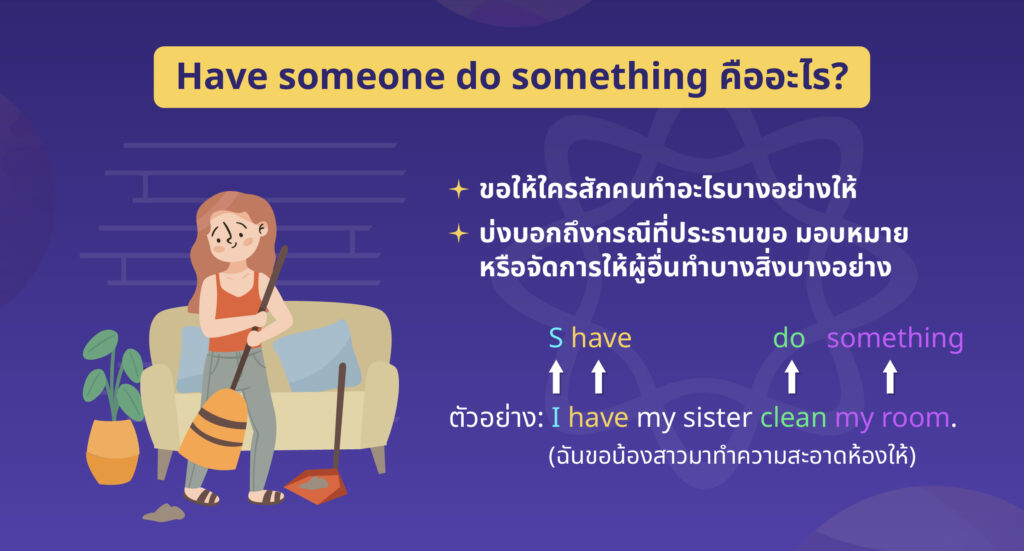
รายละเอียดการใช้ have someone do something
Have someone do something การใช้
| ประเภทประโยค | โครงสร้าง have someone do something | วิธีการใช้ | ตัวอย่าง |
| ประโยคบอกเล่า (Active) | S + have/has someone do something | เมื่อออกคำสั่งให้ใครทำอะไร | Examiners are ready to start this test. Have the first candidate come in, please. (ผู้คุมสอบพร้อมที่จะเริ่มการทดสอบนี้แล้ว ให้ผู้สมัครคนแรกเข้ามาได้เลย) |
| เมื่อขอให้ใครทำอะไร | I had my neighbors look after my house when I went on a business trip. (ฉันขอให้เพื่อนบ้านดูแลบ้านให้ฉันตอนที่ฉันไปทำงานต่างจังหวัด) | ||
| ประโยคที่ประธานเป็นผู้ถูกกระทำ (Passive) | S + have + something + V-ed/3 | เป็นการแสดงออกถึงการขอความช่วยเหลือโดยถูกใครบางคนขอให้ทำอะไรบางอย่าง | They had their house cleaned last week. (พวกเขาขอให้คนมาทำความสะอาดบ้านเมื่อสัปดาห์ที่แล้ว) |
| เป็นการแสดงออกถึงสิ่งไม่ดีหรือสิ่งเลวร้ายที่เกิดขึ้นกับผู้พูดที่เกิดจากผู้อื่น | I have had my bag stolen. (ฉันถูกขโมยกระเป๋า) |
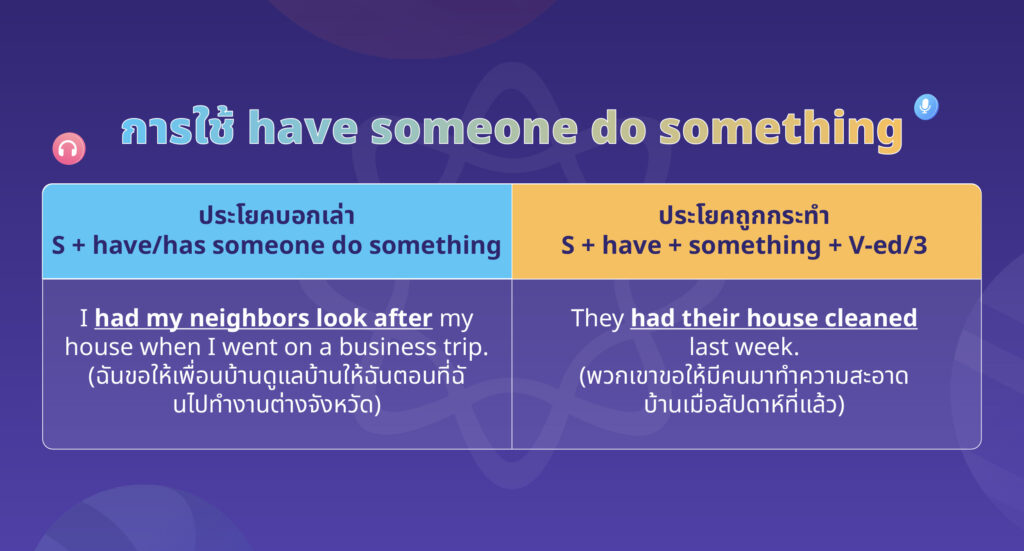
>>> Read more:
- Passive Voice: สูตร ตัวแปร และการใช้งานที่แม่นยำที่สุด (พร้อมแบบฝึกหัด)
- ตาราง Irregular Verbs ในภาษาอังกฤษที่ครบถ้วนและถูกต้องที่สุด
วิธีการใช้ have someone doing something
| โครงสร้าง | วิธีการใช้ | ตัวอย่าง |
| S + have/has someone doing something | ทำให้ใครบางคนทำอะไรบางอย่าง (ประธานมีผลกระทบโดยตรงต่อกรรม) | He had us laughing all through the meal. (เขาทำให้เราหัวเราะตลอดมื้ออาหาร) |
| ใครบางคนทำบางสิ่งด้วยตนเอง (ประธานไม่มีผลกระทบโดยตรงต่อกรรม) | The teacher had many students giving her flowers on Teacher’s Day. (คุณครูมีนักเรียนหลายคนมอบดอกไม้ให้ในวันครูด้วยความสมัครใจ) |
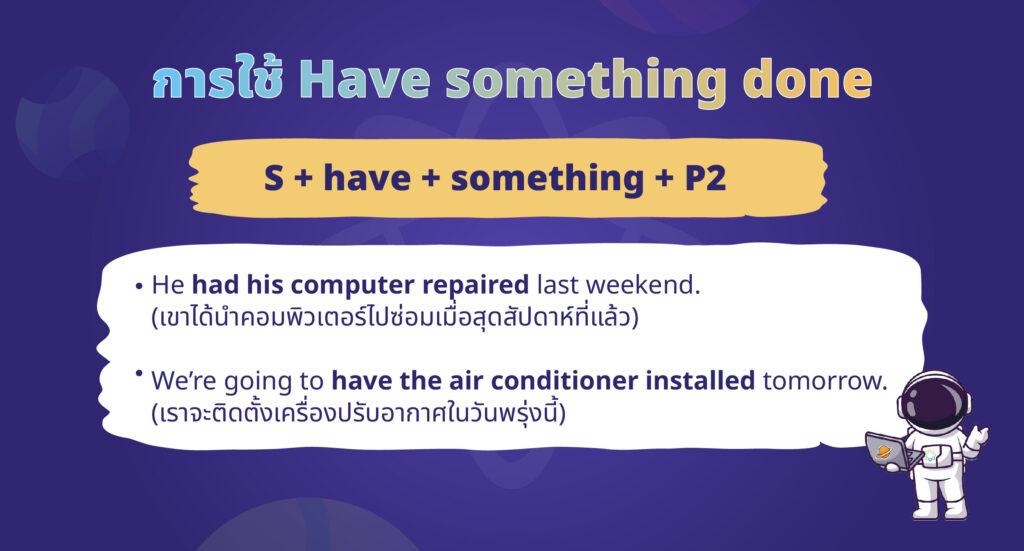
| คุณแยก have has ใช้ยังไง หรือยัง? มาทำความเข้าใจเกี่ยวกับ have และ has ในบทความต่อไปนี้ เพื่อเรียนรู้รายละเอียดเกี่ยวกับการใช้งาน โครงสร้าง และแบบฝึกหัดเพิ่มเติม |
การแยกแยะระหว่าง have someone do something กับ have someone doing something อย่างละเอียด
| Have someone do something | Have someone doing something | |
| วิธีการใช้ | มักใช้เมื่อเราต้องการพูดว่า “ขอให้ใครบางคนทำอะไรบางอย่างให้” และการกระทำนี้มักเกิดขึ้นเป็นประจำ | มักใช้เมื่อพูดว่า “ใครบางคนกำลังทำอะไรบางอย่าง” และการกระทำนี้กำลังเกิดขึ้นอยู่ |
| ตัวอย่าง | I have her do gardening for me as I am too hectic to have time to do such a task. (ฉันขอให้เธอทำสวนให้ฉันเพราะฉันยุ่งเกินกว่าจะมีเวลาทำงานนี้) | I have her gardening for me as I am too hectic to have time to do such a task. (เธอกำลังทำสวนให้ฉันเพราะฉันยุ่งเกินกว่าจะมีเวลาทำงานนี้) |
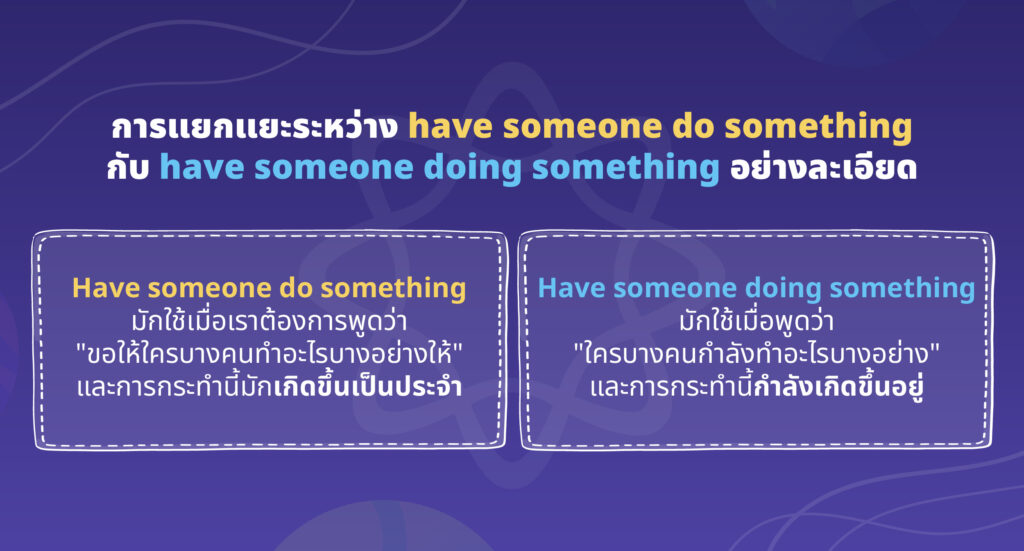
โครงสร้างที่คล้ายคลึงกับ have someone do something
| โครงสร้าง | ความหมาย | ตัวอย่าง |
| Get someone to do something | ขอให้ใครบางคนทำอะไร | I’ll get my brother to fix my bike. (ฉันจะขอให้พี่ชายซ่อมจักรยานให้ฉัน) |
| Make someone do something | บังคับให้ใครบางคนทำอะไร | The teacher made the students write an essay. (ครูสั่งให้นักเรียนเขียนเรียงความ) |
| Have something done | ทำให้บางสิ่งถูกทำ (ถูกกระทำ) | I had my hair cut yesterday. (เมื่อวานนี้ฉันตัดผม) |
| Let someone do something | อนุญาตให้ใครบางคนทำอะไร | My parents let me stay out late last night. (เมื่อคืนนี้พ่อแม่อนุญาตให้ฉันกลับดึก) |
| Ask someone to do something | ขอให้ใครบางคนทำอะไร | She asked her friend to help with the project. (เธอขอให้เพื่อนของเธอช่วยทำโครงการนี้) |
| Want someone to do something | ต้องการให้ใครบางคนทำอะไร | I want you to clean your room. (ฉันต้องการให้คุณทำความสะอาดห้องของคุณ) |
| Tell someone to do something | บอกให้ใครบางคนทำอะไร | He told his assistant to prepare the meeting room. (เขาบอกให้ผู้ช่วยเตรียมห้องประชุม) |
| Force someone to do something | บังคับให้ใครบางคนทำอะไร | The manager forced the employees to work overtime. (ผู้จัดการบังคับให้พนักงานทำงานล่วงเวลา) |
| Require someone to do something | กำหนดให้ใครบางคนทำอะไร | The school requires students to wear uniforms. (โรงเรียนกำหนดให้นักเรียนสวมเครื่องแบบ) |
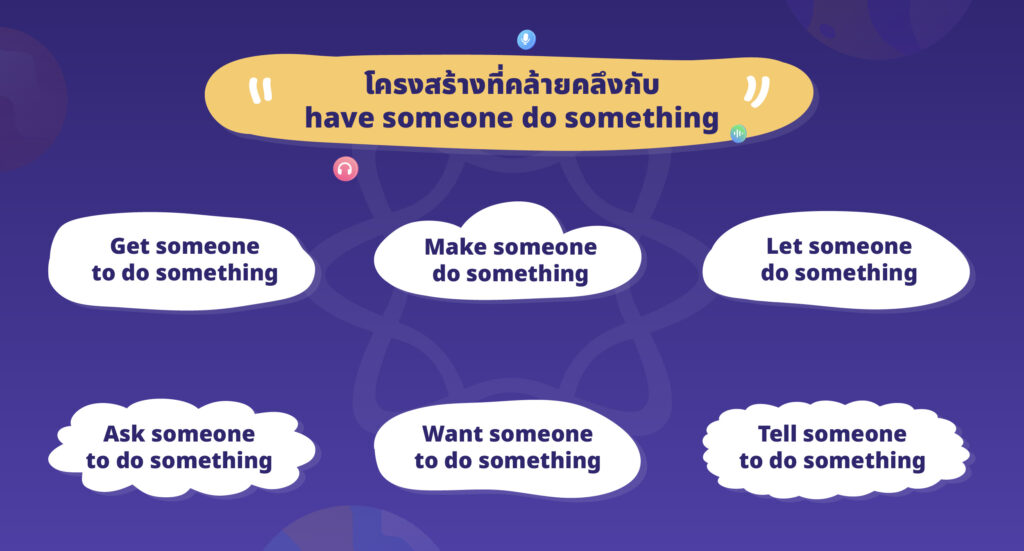
คำถามที่พบบ่อย
Get someone to do something ใช้ยังไง?
Get someone to do something ใช้เพื่อบ่งบอกว่าประธานขอหรือสั่งให้ใครบางคนทำบางอย่าง โดยเน้นไปที่ผู้กระทำมากกว่าการกระทำเอง ซึ่งต่างจากโครงสร้าง have something done ที่เน้นที่การกระทำมากกว่า
ตัวอย่างการใช้ get someone to do something:
- I’ll get my brother to help me with the project. (ฉันจะขอให้น้องชายของฉันช่วยทำโปรเจกต์นี้)
- They got the technician to fix the internet connection. (พวกเขาได้ให้ช่างมาแก้ไขการเชื่อมต่ออินเทอร์เน็ต)
Have something done ใช้ยังไง?
โครงสร้าง Have something done เป็นรูปแบบถูกกระทำ (Passive) ของโครงสร้าง Have someone do something และใช้เมื่อผู้พูดต้องการบอกว่ามีใครบางคนทำสิ่งใดสิ่งหนึ่งให้เขา เช่น ขอ จ้าง หรือจัดการให้คนอื่นทำบางอย่างให้ตนเอง
Have something done ตัวอย่างประโยค:
- He had his computer repaired last weekend. (เขาได้นำคอมพิวเตอร์ไปซ่อมเมื่อสุดสัปดาห์ที่แล้ว)
- We’re going to have the air conditioner installed tomorrow. (เราจะติดตั้งเครื่องปรับอากาศในวันพรุ่งนี้)

Let someone do something ตัวอย่างประโยค
- Let her finish her homework before going out. (ให้เธอทำการบ้านให้เสร็จก่อนแล้วค่อยออกไปข้างนอก)
- They let the children play outside until it gets dark. (พวกเขาอนุญาตให้เด็ก ๆ เล่นนอกบ้านจนกว่าฟ้าจะมืด)
Get something done ตัวอย่างประโยค
- I need to get my car fixed before the trip. (ฉันต้องซ่อมรถก่อนออกเดินทาง)
- She got her hair done for the party. (เธอทำผมเพื่อเตรียมตัวไปงานปาร์ตี้)
แบบฝึกหัด have someone do something

แบบฝึกหัด
แบบฝึกหัดที่ 1: เลือกคำที่ถูกต้องที่สุดเพื่อเติมลงในช่องว่าง
- I have her … (finish/ finishing) my tasks at work as I’m currently sick.
- He had them … (laugh/ laughing) as he’s good at telling jokes.
- I think this service is excellent as I have some people… (do/ doing) all the household chores for me.
- She has her assistant … (set/ setting) up an important meeting.
- The song had her … (feel/ feeling) better after being depressed because of her breakup with her boyfriend.
แบบฝึกหัดที่ 2: เขียนประโยคใหม่โดยให้ความหมายคงเดิม
- The chef cooked a delicious meal for us.
- The hairdresser styled my hair.
- The artist painted a beautiful picture.
- The tailor made a new suit for him.
- The mechanic repaired my car.
- The gardener planted some flowers.
- The electrician fixed the outlet.
- The plumber unclogged the drain.
- The babysitter looked after the children.
- The decorator painted the walls.
แบบฝึกหัดที่ 3: เลือกคำตอบที่ถูกต้องที่สุดเพื่อทำให้ประโยคสมบูรณ์
- My boss is very demanding. She always ________ me work overtime.
- A. has
- B. have
- C. having
- I can’t stand it when my neighbor ________ his dog bark all night.
- A. has
- B. have
- C. having
- I ________ the mechanic check my car every six months.
- A. has
- B. have
- C. having
- My mother doesn’t like it when I ________ the dishes late at night.
- A. have
- B. have
- C. having
- She ________ her assistant prepare the presentation for the meeting.
- A. has
- B. have
- C. having
- The teacher ________ the students write an essay.
- A. has
- B. have
- C. having
- I can’t believe he ________ his kids play video games all day long.
- A. has
- B. have
- C. having
- They ________ the workers build a new house.
- A. has
- B. have
- C. having
- I don’t like it when my roommate ________ loud music while I’m trying to study.
- A. has
- B. have
- C. having
- She ________ her gardener mow the lawn every week.
- A. has
- B. have
- C. having
เฉลย
แบบฝึกหัดที่ 1:
| 1. finishing | 2. laughing | 3. doing | 4. set | 5. feeling |
แบบฝึกหัดที่ 2:
- We had the chef cook a delicious meal for us.
- I had my hair styled.
- They had the artist paint a beautiful picture.
- He had the tailor make a new suit.
- I had my car repaired.
- They had the gardener plant some flowers.
- We had the electrician fix the outlet.
- They had the plumber unclog the drain.
- They had the babysitter look after the children.
- They had the decorator paint the walls.
แบบฝึกหัดที่ 3:
| 1. A | 2. C | 3. | 4. C | 5. A | 6. A | 7. C | 8. B | 9. C | 10. A |
บทความข้างต้นคือเนื้อหาทั้งหมดเกี่ยวกับโครงสร้าง have someone do something เพื่อให้คุณได้ศึกษาเพิ่มเติม หวังว่าข้อมูลเหล่านี้จะช่วยให้คุณเข้าใจโครงสร้างประโยคประเภทนี้มากขึ้น และอย่าลืมเข้ามาที่ ELSA Speak เพื่ออัปเดตความรู้เกี่ยวกับคำศัพท์และไวยากรณ์ภาษาอังกฤษทุกวันนะ!
ปัจจุบัน การตั้ง ชื่อทีมภาษาอังกฤษ กำลังได้รับความนิยมจากหลายทีม ชื่อกลุ่มภาษาอังกฤษหรือชื่อสั้นๆ ไม่เพียงแต่แสดงถึงจิตวิญญาณของทีมเท่านั้น แต่ยังเป็นวิธียืนยันบุคลิกภาพอีกด้วย ตาม ELSA Speak มาเรียนรู้ 200+ ชื่อกลุ่มน่ารักๆ ภาษาอังกฤษ กันเลย
ชื่อกลุ่มภาษาอังกฤษ ความหมายดีๆ
| ชื่อกลุ่มภาษาอังกฤษ ความหมายดีๆ | ความหมาย |
| Army of Darkness | กลุ่มกองทัพแห่งความมืด |
| Awesome Knights | กลุ่มอัศวินผู้ยิ่งใหญ่ |
| Basset Hounds | กลุ่มบาสเซ็ตฮาวด์ |
| Bearcats | กลุ่มแรคคูน |
| Big Diggers | กลุ่มคนงานเหมืองผู้ยิ่งใหญ่ |
| Blaze Warriors | กลุ่มนักรบไฟ |
| Black Panthers | กลุ่มเสือดำ |
| Blue Tigers | กลุ่มเสือน้ำเงิน |
| Condors | กลุ่มอีแร้ง |
| Crazy Rabbits | กลุ่มกระต่ายจอมซน |
| Crazy Chipmunks | กลุ่มกระรอกขี้เล่น |
| Chunky Monkeys | กลุ่มลิงอ้วน |
| Devil Ducks | กลุ่มลูกเป็ดขี้เหร่ |
| DragonBlade | กลุ่มลิ้นมังกร |
| Dream Team | กลุ่มดรีมทีม |
| Dynamic Energy | กลุ่มพลังงานแบบไดนามิก |
| Eagles | กลุ่มอินทรีผู้กล้าหาญ |
| Dream Makers | กลุ่มผู้สร้างความฝัน |
| Fighting Cats | กลุ่มแมวสู้ๆ |
| Gators | กลุ่มจระเข้ |
| Gladiator Riot | กลุ่มกลาดิเอเตอร์จลาจล |
| Golden Eagles | กลุ่มอินทรีทองคำ |
| Hawk Eyes | กลุ่มตาเหยี่ยว |
| Heart Warmers | กลุ่มผู้อบอุ่นหัวใจ |
| Happy Feet | กลุ่มแฮปปี้ฟุต |
| Jaguars | กลุ่มจากัวร์ |
| Leopards | กลุ่มเสือดาว |
| Lions | กลุ่มสิงโต |
| Llamas | กลุ่มคาเมล |
| Penguins | กลุ่มเพนกวินน่ารัก |
| Polar Bears | กลุ่มหมีขั้วโลก |
| Ravens | กลุ่มอีกาดำลึกลับ |
| Retrievers | กลุ่มสุนัขพันธุ์รีทรีฟเวอร์ |
| Rhinos | กลุ่มไรโน |
| Roaring Tigers | กลุ่มเสือคำราม |
| Sea Dogs | กลุ่มสุนัขทะเล |
| Sea Lions | กลุ่มสิงโตน้ำ |
| Seawolves | กลุ่มหมาป่าน้ำ |
| Squirrels | กลุ่มกระรอก |
| Stormy Petrels | กลุ่มนกนางนวล |
| The Achievers | กลุ่มผู้ประสบความสำเร็จ |
| Team No.1 | ทีมที่ 1 |
| Team Tigers | กลุ่มเสือ |
| The Chosen Ones | กลุ่มผู้ถูกเลือก |
| Work hard play hard | ทำงานหนักเล่นอย่างหนัก |
| Prove them wrong | พิสูจน์ให้พวกเขาผิด |
| Worry less, smile more | กังวลน้อยลง ยิ้มมากขึ้น |
| Enjoy today | เพลิดเพลินไปกับวันนี้ |
| No pain, no gain | ไม่มีความเจ็บปวดก็ไม่มีกำไร |
| The Chamber Of Secrets | ห้องแห่งความลับ |
| I Hate Monday | กลุ่มฉันเกลียดวันจันทร์ |
| Non-Stop Notifications | กลุ่มการแจ้งเตือนไม่หยุด |
| Baddies and Buddies | ตัวร้ายและเพื่อนซี้ |
| YOLO | You Only Live Once (คุณมีชีวิตอยู่เพียงครั้งเดียว) |
| Left On “Read” | กลุ่มคนอ่านไม่ตอบ |
| Besties for the Resties | เพื่อนที่ดีที่สุดตลอดกาล |
| Gentlemen’s Club | สโมสรสุภาพบุรุษ |
| Study Wars | กลุ่มสงครามการเรียน |
| Lone Wolfpack | กลุ่มฝูงหมาป่าโลน |
| Best Friends Club | กลุ่มเพื่อนสนิท |

>>> Read more: ชื่อแมวน่ารักๆ อังกฤษ 100+ ความหมายดีๆ เท่ และเป็นเอกลักษณ์
ชื่อกลุ่มดีๆเป็นภาษาอังกฤษสำหรับครอบครัวและเพื่อนฝูง
| ชื่อกลุ่ม | ความหมาย |
| Avengers | กลุ่มพร้อมต่อสู้และเผชิญความท้าทายร่วมกัน |
| Beauties | กลุ่มคนสวย |
| Catalyst | กลุ่มตัวเร่งปฏิกิริยา |
| Dolphins | กลุ่มปลาโลมา |
| Drama Club | ชมรมดราม่า |
| Diamondbacks | กลุ่มเพชรดำ |
| Eclipse | กลุ่มครอบครัวที่ทรงพลังอย่างยิ่ง ทะลวงผ่านและเปลี่ยนแปลงทุกสิ่งอยู่เสมอ |
| Fusion | กลุ่มเพื่อนที่คอยเป็นเพื่อนและร่วมมือเพื่อชัยชนะเสมอ |
| Friendship | เป็นเพื่อนกันตลอดไป |
| Friends Forever | เพื่อนกันตลอดไป |
| Fabulous Fairies | เปลี่ยนความปรารถนาอันมหัศจรรย์ให้กลายเป็นความจริง |
| Family unity | กลุ่มครอบครัวสามัคคี |
| Fab 5 | กลุ่มห้าดีกว่าสี่ |
| Great Mates | กลุ่มเพื่อนที่ดี |
| Generation X | กลุ่มเจเนอเรชั่น X |
| Innovators | กลุ่มนักนวัตกรรม |
| King Speed | ราชาแห่งความเร็ว |
| Mavericks | ผู้เป็นอิสระ |
| Minions | กลุ่มมินเนี่ยน |
| Lemon Drops | ทีมเล็กๆที่น่ารัก |
| Plenty of Twenties | 20 ตลอดไป |
| Pussy Cats | กลุ่มใครๆ ก็รักลูกแมว |
| Partridge Squad | ทีมพาร์ทริดจ์ |
| Phoenix | กลุ่มเอาชนะความยากลำบากเพื่อให้แข็งแกร่งกว่าที่เคย |
| Revolution | กลุ่มการปฏิวัติ |
| Rainbow Warriors | กลุ่มนักรบสายรุ้ง |
| Teenage Dream | กลุ่มความฝันของวัยรุ่น |
| Titans | กลุ่มเพื่อนมีความพากเพียรและอุตสาหะในชีวิตเสมอ |
| Trailblazers | กลุ่มผู้บุกเบิก |
| Visionaries | กลุ่มเพื่อนที่หลงใหลในการสำรวจ |
| Velocity | กลุ่มแข่งกันเพื่อบรรลุเป้าหมาย |
| Zenith | กลุ่มอยู่ที่จุดสูงสุดของความสมบูรณ์แบบเสมอ |

>>> Read more:
- 300+ ไอเดียชื่อภาษาอังกฤษที่น่ารักสำหรับเด็กหญิงและเด็กชาย
- เสนอ 24+ วิธีตั้งชื่อไอจีภาษาอังกฤษเรียบง่ายและน่ารัก
- 100+ คำเรียกแฟน ภาษาอังกฤษ Boy friend/girl friend ความหมายน่ารักๆ
ชื่อกลุ่มดีๆเป็นภาษาอังกฤษสำหรับชั้นเรียน
| ชื่อกลุ่มเท่ๆ | ความหมาย |
| Brainy Badgers | ฉลาดและขยันหมั่นเพียร |
| Brainstormers | การระดมความคิด |
| Best and Brightest | ทีมนักเรียนที่ดีที่สุดในชั้นเรียน |
| Clever Clowns | ตัวตลกอัจฉริยะ |
| Coffee And Class Notes | ดื่มกาแฟและจดบันทึกบทเรียน |
| Check The Syllabus | ตรวจสอบหลักสูตร |
| Checks Notes | ตรวจสอบบันทึก |
| Diligent Dingos | เรียนเก่ง |
| Everyday, I’m Studying | ฉันไปเรียนทุกวัน |
| Expertly Educated Eagles | ผู้เชี่ยวชาญในสาขา |
| Friends Who Study Together | เพื่อนเรียนด้วยกัน |
| Gang of Greatness | พิชิตทั้งหมดด้วยกัน |
| Industrious Irises | ชั้นเรียนที่ขยัน |
| It’s Elementary | ง่ายเหมือนโรงเรียนอนุบาล |
| Intelligent Iguanas | ชั้นเรียนที่ฉลาดที่สุด |
| Learn Something New | เรียนรู้สิ่งใหม่ |
| Math Lovers Only | กลุ่มสำหรับคนรักคณิตศาสตร์ |
| No Chance | ไม่มีใครควรยุ่งกับกลุ่มของคุณ |
| Not Your Average Study Group | ไม่ใช่กลุ่มการศึกษาทั่วไปของคุณ |
| Our Virtual Library | ห้องสมุดเสมือนจริง |
| Pals From Class | เพื่อนร่วมชั้น |
| Problem: Solved | แก้ไขปัญหาแล้ว |
| Presentation Pros | การนำเสนอโดยผู้เชี่ยวชาญ |
| Perfect Pirates | กลุ่มคลาสที่สมบูรณ์แบบ |
| Raise Your Hand | ยกมือขึ้น |
| Study Buddies | เพื่อนสนิทเรียนด้วยกัน |
| Smart Cookies | ฉลาดและคล่องตัว |
| See You In The Lab | เจอกันที่ห้องแล็บ |
| Talented Tyrants | เอาชนะทั้งหมดเสมอ |
| The Immortals | ซูเปอร์ฮีโร่ |
| To Sum It Up | มาสรุปบทเรียนกันดีกว่า |
| You’re So Humerus | คุณตลกมาก |
| You Live and Learn | เรียนรู้ทุกวัน |
| Win in Leaning | ชนะในการเรียนรู้เสมอ |

>>> Read more:
- 300+ ไอเดียตั้งชื่อภาษาอังกฤษผู้หญิง อัปเดตล่าสุด
- วิธีใช้คํานําหน้าชื่อ ภาษาอังกฤษ Mr Mrs Ms Miss และวิธีแยกแยะอย่างถูกต้อง
- เบ๊บ ภาษาอังกฤษ แปลว่าอะไร? วิธีใช้คำว่า“babe” ที่ถูกต้องในการสื่อสาร
ชื่อกลุ่มเป็นภาษาอังกฤษสำหรับที่ทำงาน
| ชื่อกลุ่ม | ความหมาย |
| Always Excelling | ทีมงานยอดเยี่ยมเสมอ |
| Business as Usual | ยังคงทำงานตามปกติ |
| Business Preachers | นักเทศน์ทางธุรกิจ |
| Career Champions | แชมเปี้ยนส์ในที่ทำงาน |
| Coffee Crew | ทีมกาแฟ |
| Capitalist Crew | กลุ่มนายทุน |
| Death and Taxes | ความตายและภาษี |
| Employees of the Year | พนักงานดีเด่นแห่งปี |
| Follow the Leader | ติดตามกัปตันเสมอ |
| Is It Friday Yet? | กลุ่มคนรักวันศุกร์ |
| Is It 5:00 Yet? | ทีมรอ 5 โมง |
| Ingenious Geniuses | อัจฉริยะผู้เก่งกาจ |
| Let’s Do It | มาทำกันเถอะ |
| Mission: Possible | ภารกิจที่เป็นไปได้ |
| Mind Benders | ผู้บิดเบือนจิตใจ |
| Partners in Crime | พันธมิตรในงาน |
| Peak Performers | ผู้ประสบความสำเร็จสูงสุด |
| Tech Team | ทีมงานเทคนิค |
| Teamwork Makes the Dream Work | จิตวิญญาณของทีมสร้างความสำเร็จ |
| The Dream Team | ดรีมทีม |
| The Untouchables | แตะต้องไม่ได้ |
| The Achievers | คนที่ประสบความสำเร็จ |
| The A-Team | กลุ่มคลาสเอ |
| The Accountaholics | ผู้ชื่นชอบการบัญชี |
| The Ultimate Team | ทีมที่แข็งแกร่งที่สุด |
| The Professional Network | เครือข่ายมืออาชีพ |
| The Team Titans | ทีมมีความยืดหยุ่นอยู่เสมอ |
| The Workaholics | กลุ่มคนบ้างาน |
| The Work Warriors | ทำงานเหมือนนักรบ |
| Workaholics | คนที่หมกมุ่นอยู่กับงาน |

>>> Read more:
- 80 คำอวยพรงานแต่งภาษาอังกฤษที่เหมาะสมและไพเราะ มีความหมายที่ควรรู้
- 100+ แคปชั่นสุขสันต์วันครบรอบภาษาอังกฤษ (Happy Aniversary)
- รวบรวม 65+ คําอวยพรเด็กแรกเกิดภาษาอังกฤษที่ดีที่สุพร้อมคำแปล
ชื่อกลุ่มดีๆเป็นภาษาอังกฤษสำหรับสาวๆ
| ชื่อกลุ่ม | ความหมาย |
| Amazonian Mermaids | นางเงือกแห่งอเมซอน |
| Apple Sour | แอปเปิ้ลเปรี้ยว |
| Backstreet Girls | ตั้งตามวง Backstreet Boys |
| Bad Girlz | แบดเกิร์ล |
| Beauties | สาวสวย |
| Blueberries | บลูเบอร์รี่ |
| Butterflies | ผีเสื้อ |
| Charlie’s Angels | กลุ่มสุภาพสตรี |
| Cupcakes Anonymous | คัพเค้กลึกลับ |
| Coffee Lovers | คนรักกาแฟ |
| Crush | ครัช |
| Divine Angels | เทวดาศักดิ์สิทธิ์ |
| Drama Club | ชมรมดราม่า |
| Fusion Girls | สาวๆ อ่อนโยน |
| Fabulous Fairies | นางฟ้าที่ยอดเยี่ยม |
| Fantasticans | คนดี |
| Flower Power | ดอกไม้อันทรงพลัง |
| Fly girls | สาวบินสูง |
| Fabulous Fairies | ทีมทำให้ความปรารถนาอันมหัศจรรย์เป็นจริง |
| Estrogen Express | ลูกสาวที่น่าภาคภูมิใจ |
| Honey Bees | ผึ้งหวาน |
| Lil Cuties | สาวน้อยน่ารัก |
| Lovable Ladies | สาวๆที่น่ารัก |
| Pink Panthers | นักรบโบว์แดง |
| Pegasus | ทีมสนุกเสมอ |
| The Blond | สาวผมบลอนด์ |
| The Flaming Pink Flamingos | นกฟลามิงโก้สีชมพู |
| Violets | ดอกไวโอเล็ตที่สวยงามและละเอียดอ่อน |
| Wildcats | แมวป่าเซ็กซี่ |
ชื่อกลุ่มภาษาอังกฤษเท่ๆสำหรับหนุ่มๆ
| ชื่อแก๊งเท่ๆ | ความหมาย |
| 0% Risk | ความเสี่ยง 0% (ไม่มีอะไรเสี่ยงเมื่อคุณทำงานกับทีมนี้) |
| Annihilators | ผู้ทำลายล้าง |
| Avengers | ดิ อเวนเจอร์ส |
| Ambassadors | เอกอัครราชทูตผู้ทรงพลัง |
| Alpha Team | ทีมเป็นผู้นำเสมอ |
| Bad Boys | แบดบอย |
| Butchers | ทีมงานขายเนื้อ |
| Cowboys | ผู้ชายที่แท้จริง |
| Conquerors | ผู้พิชิต |
| Desert Storm | พายุทะเลทราย |
| Esquires | สุภาพบุรุษที่แท้จริง |
| Exterminators | ผู้ทำลายล้าง |
| Golden Eagles | อินทรีทองคำ |
| Grave Diggers | คนขุดหลุมศพ |
| Ghost Riders | โกสต์ไรเดอร์ส |
| Gentlemen | สุภาพบุรุษ |
| Goal Killers | นักฆ่าทองคำ |
| Gorillas In the Mist | กอริลลาในสายหมอก |
| Gunners | มือปืน |
| Hell’s Angels | นางฟ้าปีศาจ |
| Kings of Kings | กษัตริย์แห่งกษัตริย์ |
| Little Boy | เด็กน้อย |
| Mad Men | ผู้นำที่สร้างสรรค์ |
| Masters | ผู้เชี่ยวชาญ |
| Mercenaries | ทหารรับจ้าง |
| Men of Genius | ผู้ชายแห่งอัจฉริยะ |
| Insurgents | กองทัพกบฏ |
| Justice Bringers | เด็กชายผู้นำความยุติธรรม |
| No Fear | ไม่กลัว |
| No Rules | ไม่มีกฎเกณฑ์ |
| Speed Demons | ปีศาจความเร็ว (สำหรับคนชอบแข่งรถ) |
| Super Humans | ซูเปอร์แมน |
| The Bosses | บอส |
| The Capitalist | คนแกร่งในธุรกิจ |
| The Untouchables | ผู้ที่อยู่ด้านบนเสมอและเข้าถึงได้ยาก |
| Tech Warriors | นักรบเทคโนโลยี |
| Tycoons | มหาเศรษฐี |
| Wonder Boys | เด็กชายมหัศจรรย์ |
| Wanderers | ทีมสร้างแรงบันดาลใจ |

>>> Read more:
ข้อสังเกตเมื่อตั้งชื่อกลุ่มเป็นภาษาอังกฤษ
ถึงแม้ว่าหลายๆ คนอยากจะมีชื่อทีมเท่ๆเป็นภาษาอังกฤษเพื่อแยกแยะจากทีมอื่นๆ แต่ไม่รู้ว่าจะเลือกชื่ออย่างไร ชื่อกลุ่มต้องเป็นไปตามเกณฑ์ต่อไปนี้ ซึ่งต่างจากชื่อเล่นส่วนบุคคล:
- ชื่อกลุ่มจะต้องแสดงถึงวัตถุประสงค์และเป้าหมายของทั้งกลุ่ม กลุ่มของคุณเป็นกลุ่มเรียนหนังสือ กลุ่มเพื่อนสนิท กลุ่มธุรกิจ กลุ่มครอบครัว หรือกลุ่มเล่นเกม คุณจะเลือกชื่อที่เหมาะสมขึ้นอยู่กับเป้าหมายของกลุ่ม
- ชื่อกลุ่มจะต้องได้รับการตกลงของสมาชิกทุกคนในกลุ่ม หากมีความคิดเห็นที่ขัดแย้งกันมากเกินไป คุณสามารถเลือกชื่อที่ดีสักสองสามชื่อแล้วลงคะแนนเสียงข้างมาก
- เมื่อตั้งชื่อกลุ่ม คุณสามารถยึดตามคำขวัญชีวิต ความสนใจ และข้อความที่กลุ่มต้องการสื่อ นอกจากนี้ยังมีเกณฑ์ เช่น ชื่อกลุ่มที่มีความหมาย ชื่อน่ารัก ชื่อเก๋ ชื่อแหวกแนว ตั้งชื่อตามคนดัง… หากคุณอาศัยปัจจัยเหล่านี้ ก็สามารถตั้งชื่อกลุ่มของคุณได้อย่างง่ายดาย
ดังนั้น ELSA Speak ได้รวบรวม 200+ ชื่อกลุ่มภาษาอังกฤษ ที่มีความหมายดีๆ อย่าลืมจดชื่อกลุ่มเป็นภาษาอังกฤษที่มีเอกลักษณ์นี้ ไว้เพื่อตั้งให้กลุ่มของคุณ หวังว่ากลุ่มของคุณจะมีชื่อที่มีเอกลักษณ์และแสดงบุคลิกของตัวเองกันนะ

ELSA Premium Lifetime
9,999 บาท ->6,439 บาท

ELSA Pro Lifetime
3,659 บาท ->2,799 บาท

ELSA Premium 1 year
8,497 บาท ->2,885 บาท

ELSA Pro 1 year
2,499 บาท ->1,528 บาท
โครงสร้าง How long มักใช้กันทั่วไปในภาษาอังกฤษ แล้ว How long แปลว่าอะไร How long ตอบยังไง How long กับ How many times ต่างกันอย่างไร มาเรียนรู้ไปพร้อมกันกับ ELSA Speak ด้านล่างนี้กันนะ
How long แปลว่าอะไร?

How long แปลว่า “ใช้เวลานานเท่าไหร่” “ความยาวเท่าไหร่” โครงสร้าง How long ใช้เพื่อถามถึงระยะเวลาที่ใครบางคนทำงานบางสิ่งบางอย่างใช้เวลานานแค่ไหนหรือความยาวของบางสิ่งบางอย่าง
ตัวอย่าง:
- How long has Jenny lived in Korea? (เจนนี่อยู่เกาหลีมานานเท่าไรแล้ว?)
- How long does it take Kathy to go to school? (เคธี่ใช้เวลานานแค่ไหนในการไปโรงเรียน?)
- How long is Anna’s ruler? (ไม้บรรทัดของแอนนายาวเท่าไหร่?)
โครงสร้าง How long ที่ใช้บ่อย
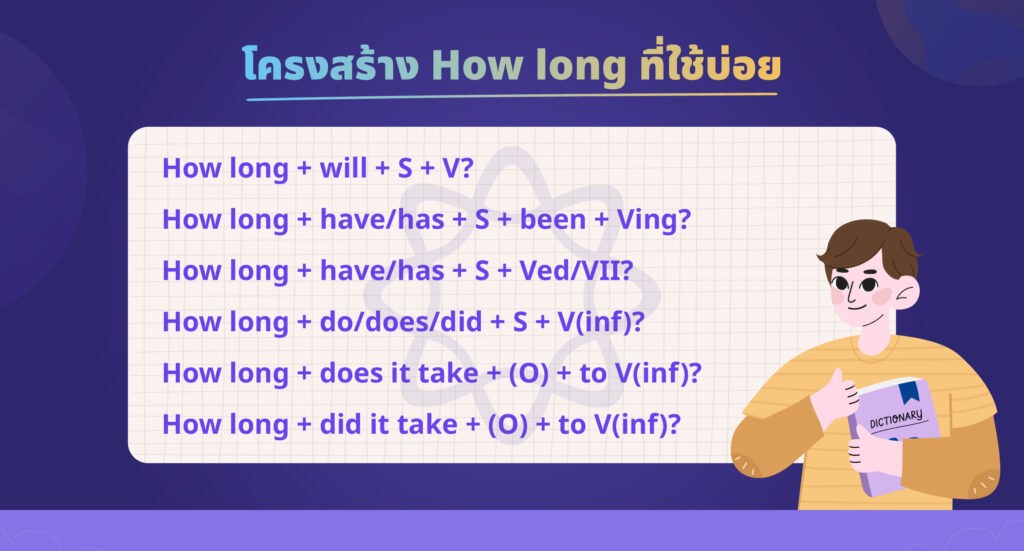
How long + will + S + V?
โครงสร้าง:
| How long + will + S + V? |
วิธีตอบ How long:
| S + will + V + FOR + ระยะเวลา |
หมายเหตุ:
- S คือประธาน
- V คือคํากริยา
โครงสร้างนี้ใช้เพื่อถามถึงระยะเวลาที่บางสิ่งจะเกิดขึ้นหรือระยะเวลาที่บุคคลจะทำอะไรบางอย่างในอนาคต
ตัวอย่าง:
How long will the meeting last? (การประชุมจะใช้เวลานานแค่ไหน?)
→ It will last for 20 minutes. (มันจะใช้เวลาราว ๆ 20 นาที)

How long + have/has + S + been + Ving?
how long ประโยคคําถาม:
| How long + have/has + S + been + Ving? |
คําตอบ:
| S + have/has + Ved/3 + FOR + ระยะเวลา หรือ S + have/has + Ved/3 + SINCE + เส้นเวลา |
โครงสร้างนี้ใช้เพื่อถามถึงระยะเวลาที่บุคคลได้ทำสิ่งใดสิ่งหนึ่งที่เกิดขึ้นในอดีต ต่อเนื่องมาจนถึงปัจจุบัน และจะยังคงดำเนินต่อไปในอนาคต
ตัวอย่าง: เพื่อน A กำลังรอเพื่อน B มารับ เพื่อน C เห็นว่าผ่านมาสักพักแล้ว แต่ B ยังไม่มารับ จึงถาม A:
How long have you been waiting? (คุณรอมานานแค่ไหนแล้ว?)
→ I’ve been waiting since 7 p.m. (ฉันรอมาตั้งแต่ 19.00 น. แล้ว)
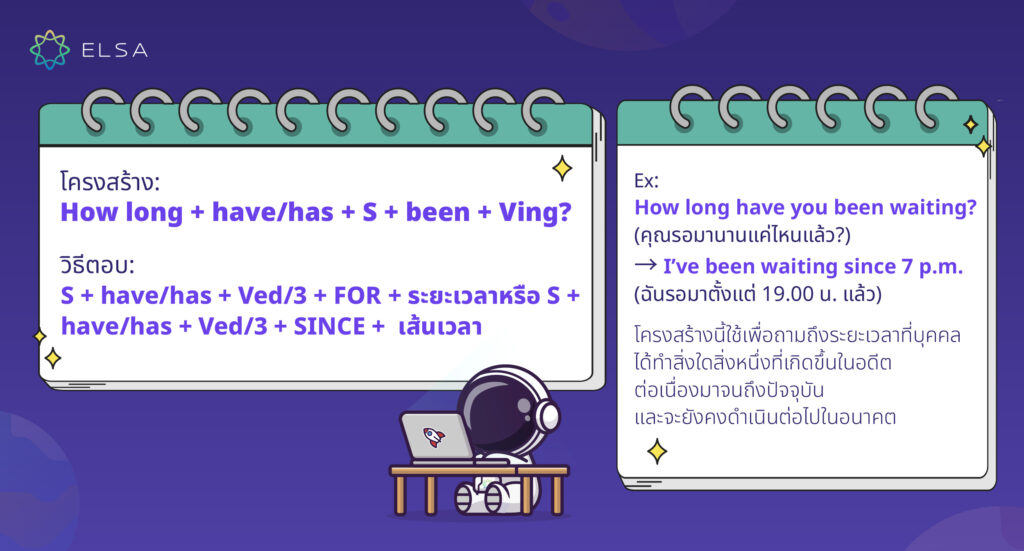
How long + have/has + S + Ved/VII?
คําถาม:
| How long + have/has + S + Ved/3? |
คําตอบ:
| S + have/has + Ved/3 + FOR + ระยะเวลาหรือ S + have/has + Ved/3 + SINCE + เส้นเวลา |
โครงสร้างนี้ใช้ปัจจุบันกาลสมบูรณ์เพื่อถามเกี่ยวกับระยะเวลาที่คนคนหนึ่งทำบางสิ่งบางอย่างจนถึงเวลาปัจจุบัน
ตัวอย่าง:
How long has John lived here? (จอห์นอยู่ที่นี่มานานเท่าไรแล้ว?)
→ He has lived here for 2 months. (เขาอาศัยอยู่ที่นี่มาสองเดือนแล้ว)
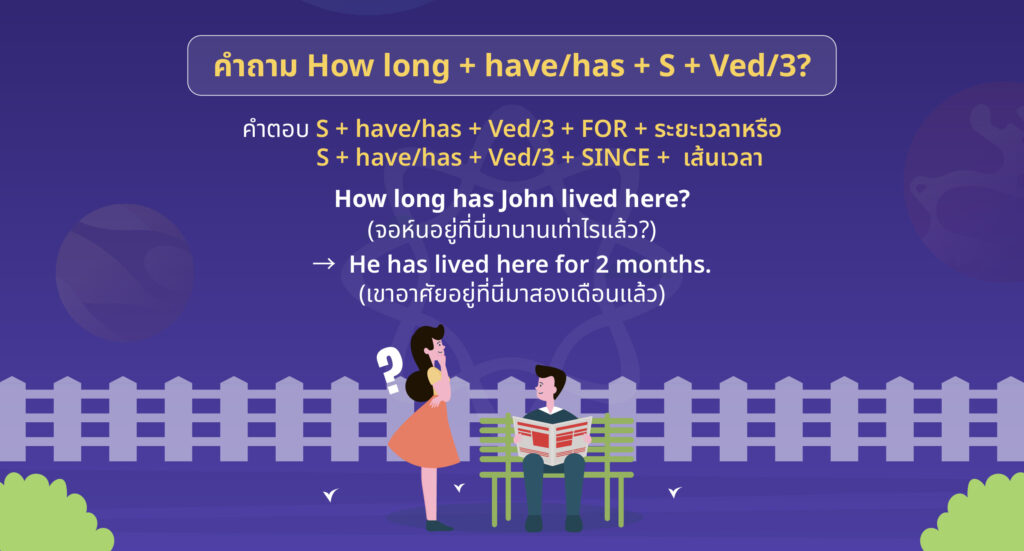
>>> Read more: การใช้ “have”, “has” และ “had” ที่ง่ายที่สุดและเข้าใจดี
How long + do/does/did + S + V(inf)?
คําถาม:
| How long + do/does/did + S + V (infinitive)? |
คําตอบ:
| S + V + for + time period |
โครงสร้าง How long นี้ใช้เพื่อถามเมื่อมีคนทำหรือได้ทำอะไรบางอย่าง โครงสร้างแบ่งออกเป็นปัจจุบันกาลและอดีตกาล
ตัวอย่าง:
How long does he exercise every day? (เขาใช้เวลานานเท่าไหร่ในการออกกำลังกายต่อวัน?)
→ He exercises for an hour every day. (เขาออกกำลังกายวันละหนึ่งชั่วโมง)
>>> Read more: Everyday กับ Every day: คำจำกัดความ ความแตกต่าง และแบบฝึกหัด
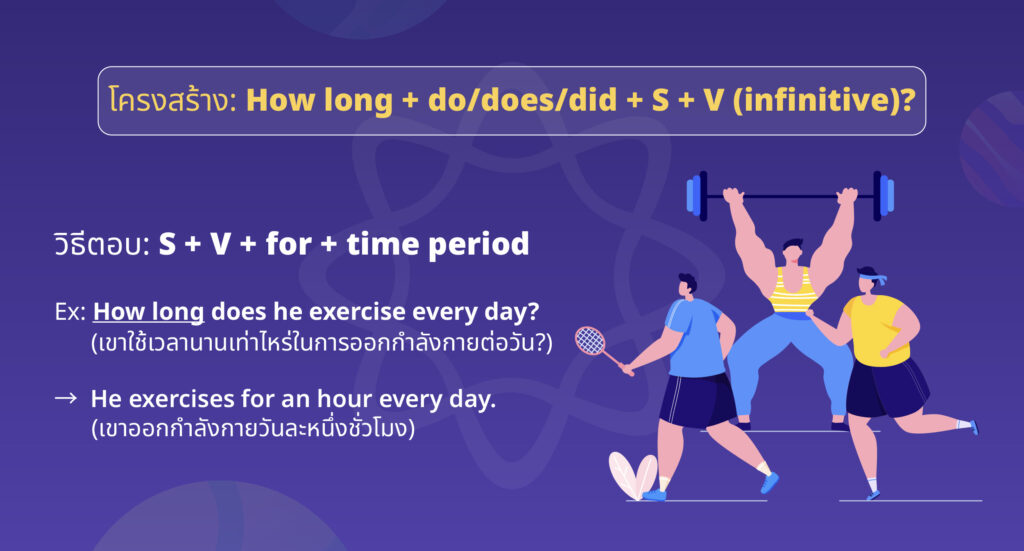
How long does it take + (O) + to V(inf)?
คําถาม:
| How long + does + it + take + O + to V? |
คําตอบ:
| It + takes + O + ระยะเวลา |
โครงสร้างกาลปัจจุบันจะใช้เมื่อถามว่าโดยปกติแล้วคน ๆ หนึ่งจะใช้เวลานานแค่ไหนในการทำบางสิ่งบางอย่าง
ตัวอย่าง:
How long does it take you to go to work? (คุณใช้เวลาเดินทางไปทำงานนานเท่าไร?)
→ It takes me about 15 minutes. (ฉันใช้เวลาประมาณ 15 นาที)

How long did it take + (O) + to V(inf)?
โครงสร้าง:
| How long + did + it + take + O + to V? |
คําตอบ:
| It + took + O + ระยะเวลา |
โครงสร้างที่ 2 นี้ใช้เมื่อถามว่าคน ๆ หนึ่งใช้เวลานานแค่ไหนในการทำสิ่งใดสิ่งหนึ่งในอดีต
ตัวอย่าง:
How long did it take her to draw that picture? (เธอใช้เวลาในการวาดรูปนั้นนานแค่ไหน?)
→ It took her 3 days. (เธอใช้เวลา 3 วัน)
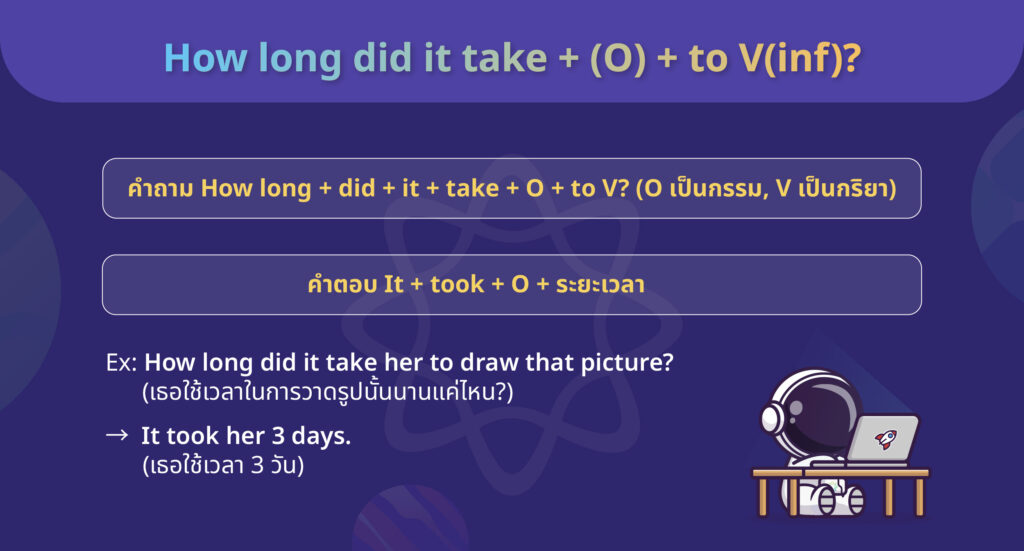
วิธีใช้ How long
| วัตถุประสงค์ | วิธีใช้ | ตัวอย่าง |
| เมื่อพูดถึงความยาวของสิ่งของ | ใช้เมื่อคุณต้องการถามถึงความยาวที่วัดได้ของสิ่งของบางอย่าง | How long is this skirt? (กระโปรงตัวนี้ยาวเท่าไหร่?) How long is this pipeline? (ท่อนี้ยาวเท่าไหร่?) |
| เมื่อพูดถึงจะใช้เวลานานแค่ไหน | มักใช้เพื่อถามถึงระยะเวลาและนั่นคือช่วงระยะเวลาหนึ่ง ซึ่งมีจุดเริ่มต้นและจุดสิ้นสุด ดังนั้น สําหรับโครงสร้างนี้ ในคำตอบจะมีคำบุพบท “for” หรือ “since” | How long has the teacher left? – For twenty minutes. (คุณครูออกไปนานเท่าไหร่แล้ว? – 20 นาทีแล้ว) How long has Katy been in England? – Since 2020. (เคธี่อยู่อังกฤษมานานแค่ไหนแล้ว? – ตั้งแต่ปี 2563) |
| เมื่อพูดถึงการใช้เวลาทำสิ่งใดสิ่งหนึ่ง | ใช้เพื่อถามโดยมีจุดประสงค์เพื่อถามว่าคน ๆ หนึ่งใช้เวลาทำสิ่งใดสิ่งหนึ่งนานเท่าไหร่ | How long does it take you to draw a picture? (คุณใช้เวลาในการวาดรูปนานเท่าไหร่?) How long will it take to fly to Moscow? (บินไปมอสโคว์ใช้เวลานานแค่ไหนเหรอ?) |
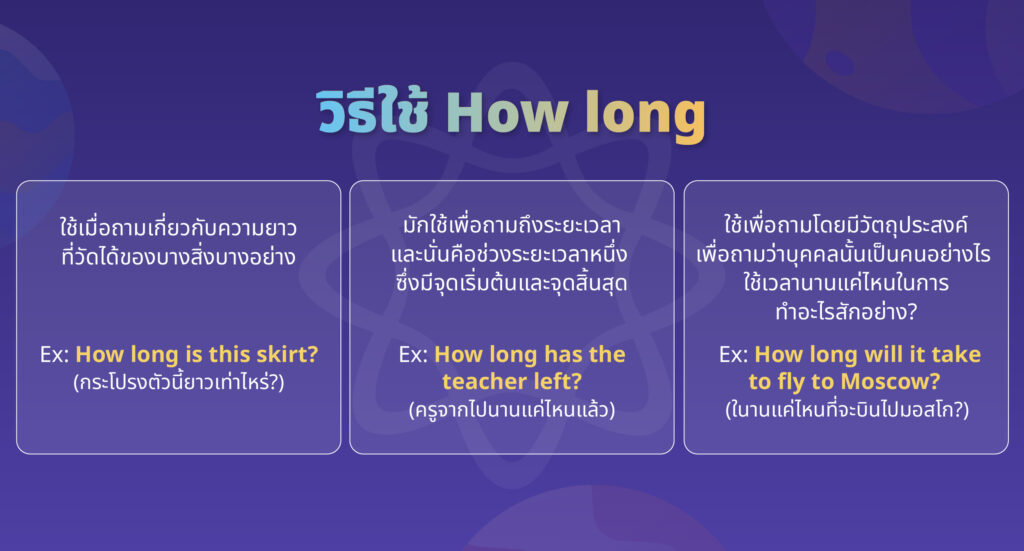
แยกแยะระหว่างโครงสร้าง How long กับ How many times, How much time และ When
แยกแยะระหว่าง How long กับ How many times
| How long | How many times | |
| ความคล้ายคลึงกัน | โครงสร้างทั้งสองใช้คำว่า “How” จึงมักสร้างความสับสนให้กับผู้ใช้ | |
| ความแตกต่าง | ใช้เพื่อถามถึงระยะเวลาหรือความยาวเท่าไหร่ในภาษาอังกฤษ | ใช้เมื่อคุณต้องการถามถึงจำนวนครั้งที่เหตุการณ์หนึ่งเกิดขึ้น |
| ตัวอย่าง | How long did Harry read that novel? – 8 days. (แฮร์รี่อ่านนวนิยายเรื่องนั้นนานแค่ไหน? – 8 วัน) | How many times has Harry read that novel? – 8 times.(แฮร์รี่อ่านนวนิยายเรื่องนั้นกี่ครั้งแล้ว? – 8 ครั้ง) |
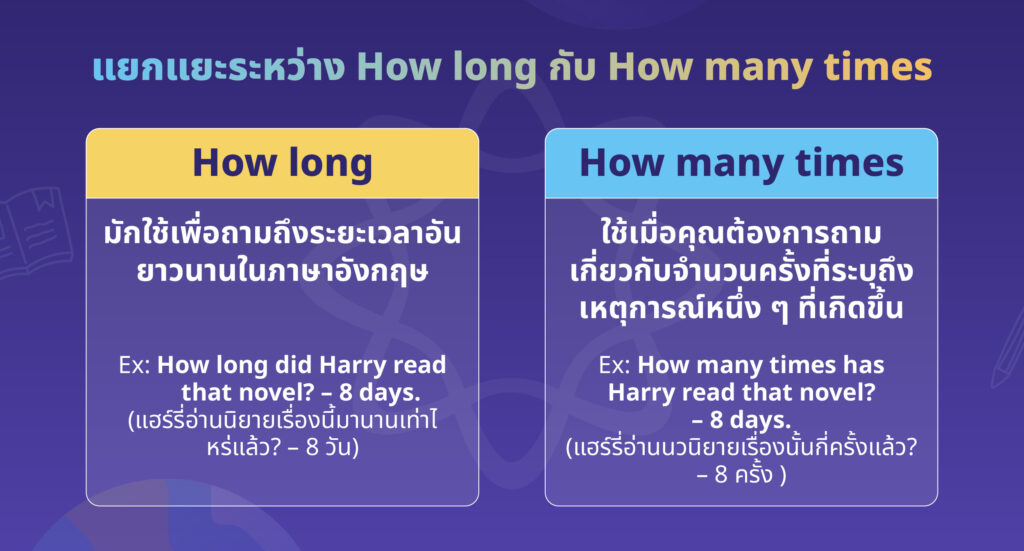
| หลายคนมักสับสนระหว่าง How long กับ How many times แต่ทั้งสองสามารถเชื่อมโยงกับการถามปริมาณหรือจำนวนได้ หากคุณเข้าใจหลักการใช้ how much how many จะช่วยให้สร้างประโยคคำถามได้แม่นยำ เช่น ถามระยะเวลา, จำนวนครั้ง หรือปริมาณสิ่งต่าง ๆ ลองเรียนรู้พร้อมตัวอย่างประโยคในบทความนี้ |
แยกแยะระหว่าง How long กับ How much time
| How long | How much time | |
| ความคล้ายคลึงกัน | ทั้ง How long และ How many time แปลว่า “นานแค่ไหน” และ “เวลานานเท่าไหร่” | |
| ความแตกต่าง | มักใช้เพื่อถามถึงระยะเวลาอันยาวนาน | ใช้เพื่อถามถึงช่วงเวลาสั้น ๆ มักจะเป็นคำแนะนํา |
| ตัวอย่าง | How long has Daisy lived in Moscow? – For more than 6 years.(เดซี่อาศัยอยู่ในมอสโคว์มานานเท่าไรแล้ว? – มากกว่า 6 ปีแล้ว) | How much time should Kathy cook the eggs? – Only 10 minutes.(เคธี่ใช้เวลาปรุงไข่นานแค่ไหน? – แค่ 10 นาทีก็พอ) |
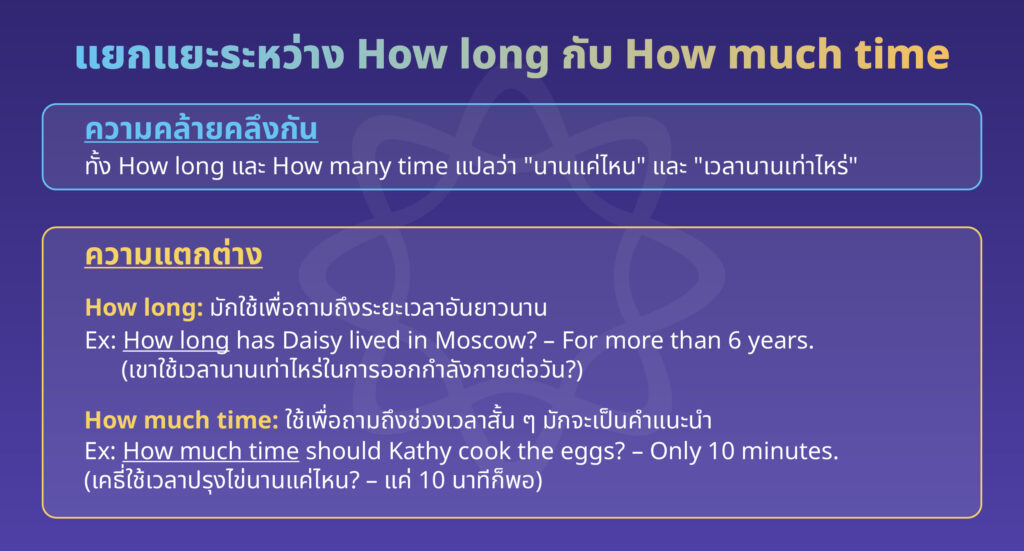
>>> Read more: การใช้ how much how many ในภาษาอังกฤษ
แยกแยะระหว่าง How long กับ When
| How long | When | |
| ความคล้ายคลึงกัน | ทั้งโครงสร้าง How long และ When ถามถึงเวลา | |
| ความแตกต่าง | ระบุระยะเวลาหรือช่วงเวลาโดยมีจุดเริ่มต้นและจุดสิ้นสุด | When ระบุเวลาหรือช่วงระยะเวลาหนึ่ง |
| ตัวอย่าง | A: How long has Harry lived in Bangkok City? – Harry has lived here for 8 years. (แฮรี่อาศัยอยู่ในกรุงเทพฯ มานานแค่ไหนแล้ว? – แฮรี่อาศัยอยู่ที่นี่มา 8 ปีแล้ว) → ถามว่าระยะเวลาเท่าไหร่ | When did Harry move to Bangkok? – Harry moved here in 2014. (แฮรี่ย้ายมากรุงเทพตั้งแต่เมื่อไหร่? – แฮรี่ย้ายมาที่นี่ในปี 2557) → ถามถึงเวลาที่เจาะจง ดังนั้น คำตอบจะเป็นเวลาที่แฮร์รี่ย้ายมากรุงเทพฯ |
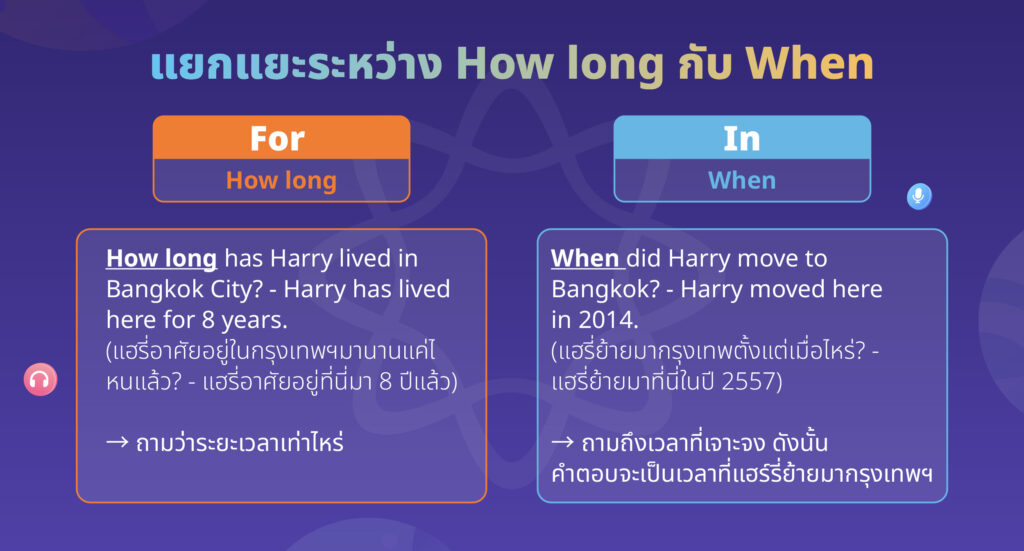
แบบฝึกหัด How long วิธีใช้
แบบฝึกหัด
บทที่ 1: จงเติม How long/How many times ลงในช่องว่าง:
1. …………… have you been waiting?- Only for a minute or two.
2. …………… has he been married?- More than 25 years.
3. …………… have you read this novel?- At least 8 times.
4.…………… will the lesson last?- 2 hours
5. …………… have you been living in this house?- For 12 years now
6. ……………have you been there?- Nine minutes
7. ……………was your stay in American?- I was there for two and a half years
8. …………… did you visit him last summer?- Almost every weekend.
9. ……………have I told you not to play volleyball in the garden?
10. ……………did the phone ring yesterday?- ‘We must have had about ten calls.
บทที่ 2: ตอบคำถามต่อไปนี้
1. How long have you lived in Thailand?
2. How long does it take you to go to school?
3. How long does it take you to eat breakfast?
4. How long have you been learning English?
บทที่ 3: จงแต่งประโยคใหม่ด้วย How long
1. How/long/it/take/you/go/work?
2. She/have/live/here/last/year.
3. How/long/have/he/been/learn/French?
4. The/lesson/will/last/30/minute.
5. How/long/have/her mother/live/Bangkok city.

ELSA Premium Lifetime
9,999 บาท ->6,439 บาท

ELSA Pro Lifetime
3,659 บาท ->2,799 บาท

ELSA Premium 1 year
8,497 บาท ->2,885 บาท

ELSA Pro 1 year
2,499 บาท ->1,528 บาท
เฉลย
บทที่ 1 (จงเติม How long/How many times)
| 1. How long | 6. How long |
| 2. How long | 7. How long |
| 3. How many times | 8. How many times |
| 4. How long | 9. How many times |
| 5. How long | 10. How many times |
บทที่ 2 (ตอบคำถาม)
1. I’ve lived in Thailand since I was born.
2. It usually takes me 15 minutes.
3. It takes me about 10 minutes.
4. I’ve been learning English for 5 years.
บทที่ 3 (แบบฝึกหัดเกี่ยวกับ How long แต่งประโยค)
1. How long does it take you to go to work?
2. She has lived here since last year.
3. How long has he been learning French?
4. The lesson will last for 30 minutes.
5. How long has her mother lived in Bangkok city?
ข้างต้นเป็นข้อมูลเกี่ยวกับโครงสร้าง How long หวังว่าการแบ่งปันข้างต้นจะช่วยให้คุณเข้าใจโครงสร้างประโยคได้ดีขึ้น นอกจากนี้ อย่าลืมเข้ามาที่ ELSA Speak เป็นประจำเพื่ออัปเดทความรู้ด้านคำศัพท์และไวยากรณ์ภาษาอังกฤษของคุณทุกวันนะ
มีหลายวิธีที่คุณสามารถขอร้องโดยใช้ภาษาอังกฤษอย่างสุภาพได้ ส่วนใหญ่การขอร้องเหล่านี้มักจะใช้ในรูปแบบของประโยคคำถาม มาร่วมกับ ELSA Speak ศึกษาประโยคที่สุภาพและเป็นทางการเมื่อทำการ ขอร้อง ภาษาอังกฤษ ในบทความนี้ได้เลย!
ประโยคขอร้องแบบสุภาพ ภาษาอังกฤษ
Would you / Would you like to / Could you …?
ประโยคขอร้องที่สุภาพที่สุดและใช้บ่อยคือ “Would you / Would you like to / Could you…” ซึ่งมีความหมายว่าขอความกรุณาภาษาอังกฤษ ประโยคเหล่านี้ฟังดูสุภาพและน่าฟังกว่าการใช้คำว่า “Do you want to …?”
โครงสร้าง:
| Would you + V(infinitive)? Would you like to + V(infinitive)? Could you + V(infinitive)? |
ตัวอย่าง:
| ประโยคคำถาม | คำตอบ |
| Would you please give me the book on the table? (คุณช่วยกรุณาหยิบหนังสือบนโต๊ะให้ฉันหน่อยได้ไหม?) | Well, I am afraid …/Yes, of course. (อ่อ ฉันเกรงว่า … /ได้อย่างแน่นอนค่ะ) |
| Could you join us at a party on this Saturday? (คุณจะมาร่วมงานเลี้ยงกับเราวันเสาร์นี้ได้ไหม?) | Yes, I am happy to join/ I am sorry I am busy this Sunday. (ได้แน่นอน ฉันยินดีมากที่ได้เข้าร่วม / ขอโทษนะ วันอาทิตย์นี้ฉันไม่ว่าง) |
| Would you like to join my birthday party on Sunday? (คุณอยากมางานวันเกิดฉันในวันอาทิตย์นี้ไหม?) | Yes, certainly/I’d like to but … (อยากสิ ต้องไปอยู่แล้ว / ฉันอยากไปนะ แต่…) |
ตัวอย่างประโยคขอร้องอื่น ๆ ในภาษาอังกฤษ:
- Would you kindly inform me who is responsible for the travel arrangements? (คุณช่วยแจ้งให้ฉันทราบได้ไหมว่าใครรับผิดชอบการจัดการเดินทาง?)
- Would you help me is asking if the person is willing to help you? (คุณจะช่วยฉันถามคนนั้นได้ไหมเต็มใจที่จะช่วยคุณหรือเปล่า?)
>>> Read more: วิธีใช้ could you please คุณช่วย…ได้ไหม และตัวอย่างประโยคคำสั่งทั่วไป

Would you mind / Do you mind …?
โครงสร้าง:
| Would you mind + Verb-ing? Do you mind if I + Verb? |
หากคุณคิดว่าคำตอบที่ได้รับอาจเป็นเชิงลบและคุณคาดหวังคำตอบในเชิงบวกมากกว่า คุณสามารถใช้สองประโยคข้างต้นได้
ลองพิจารณาตัวอย่างดังต่อไปนี้:
| ประโยคคำถาม | คำตอบ |
| Would you mind helping with my housework? (จะเป็นไรไหมถ้าคุณจะช่วยฉันทำงานบ้าน?) | Yes, certainly. (ได้อย่างแน่นอน) |
| Do you mind if I smoke? (จะเป็นไรไหม ถ้าฉันจะสูบบุหรี่?) | No, not at all! (ไม่เลย ไม่เป็นไร!) |
>>> Read more: Would you mind แปลว่าอะไร? โครงสร้าง การใช้งาน และคำตอบ

Can I / Could I / May I / Might I
เราใช้ “Can I / Could I / May I / Might I” เพื่อขอสิ่งใดสิ่งหนึ่งให้กับตัวเองอย่างสุภาพ “May” และ “Might” ถือว่าสุภาพกว่า “Can” และ “Could”
โครงสร้าง:
| Can I / Could I / May I / Might I + bare infinitive? |
ตัวอย่างต่อไปนี้จะช่วยให้คุณเข้าใจประโยคเหล่านี้มากขึ้น:
| ประโยคคำถาม | คำตอบ |
| Can I have a cake? (ฉันขอเค้กได้ไหม?) | Yes, of course. (ได้แน่นอน) |
| Could I ask you a favor? (ฉันขอรบกวนคุณหน่อยได้ไหม?) | Of course, you can. (แน่นอนสิ ตามสบายเลย) |
| Could I possibly have another book? (ฉันขอหนังสืออีกเล่มได้ไหม?) | I don’t think so. You’ve had too much. (ฉันคิดว่าคุณมีเยอะเกินไปแล้วนะ) |
| Might I leave the yoga class a bit earlier today? (วันนี้ฉันออกจากคลาสโยคะเร็วขึ้นหน่อยได้ไหม?) | Yes, you can. (ได้สิ) |
| If you’ve finished with the phone, may I borrow it? (ถ้าคุณใช้โทรศัพท์เสร็จแล้ว ฉันขอยืมได้ไหม?) | Yes, please do. (ได้สิ เชิญเลย) |
“Might” มักจะถูกใช้บ่อยในประโยคคำถามทางอ้อม เนื่องจากวิธีการพูดทางอ้อมทำให้คำขอดูสุภาพยิ่งขึ้น ตัวอย่างเช่น:
- I wonder if I might leave the yoga class a bit earlier? (ฉันคิดว่าฉันจะออกจากคลาสโยคะเร็วขึ้นหน่อยได้ไหม?)
>>> Read more: Modal verb คืออะไร? ความรู้ทั้งหมดเกี่ยวกับกริยาช่วย
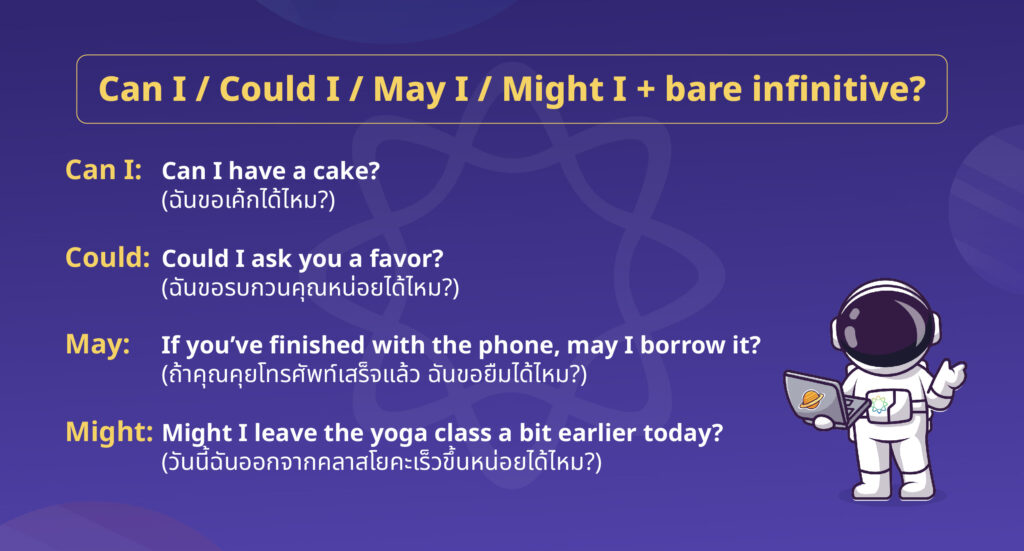
ประโยคคำถามเชิงปฏิเสธ
ประโยคคำถามเชิงปฏิเสธ เราสามารถเพิ่มคำถามไว้ท้ายประโยคปฏิเสธเพื่อเปลี่ยนเป็นประโยคคำถามได้ นี่เป็นรูปแบบการพูดที่สุภาพและเป็นทางการมากและเป็นวิธีที่ยอดเยี่ยมในการถามใครบางคนอย่างสุภาพในภาษาอังกฤษ
ตัวอย่างเช่น:
- You couldn’t do me a favor, could you? (คุณช่วยฉันไม่ได้ใช่ไหม?)
- You wouldn’t take me to the station, would you? (คุณจะไม่พาฉันไปที่สถานีใช่ไหม?)
- I don’t suppose you could clean the living room, could you? (ฉันไม่คิดว่าคุณจะทำความสะอาดห้องนั่งเล่นได้ใช่ไหม?)
Could You Possibly/Is There Any Way You Could
โครงสร้าง:
| Could You Possibly/Is There Any Way You Could + V(infinitive)? |
นี่เป็นประโยคที่ใช้เมื่อคุณต้องการขอให้ใครบางคนทำสิ่งที่อาจจะยากลำบากและไม่สะดวกสบายสำหรับพวกเขา ลองดูตัวอย่างต่อไปนี้:
- Is there any way you could change the time of the meeting? (มีวิธีไหนที่คุณสามารถเปลี่ยนเวลาประชุมได้บ้าง?)
- Do you think you could possibly lend me a bike until next Friday? (คุณคิดว่าคุณสามารถให้ฉันยืมจักรยานได้จนถึงวันศุกร์หน้าหรือเปล่า?)
- Could you possibly lend me some money? (คุณให้ฉันยืมเงินหน่อยได้ไหม?)
- Is there any way you could add one more bag? (มีวิธีไหนบ้างที่คุณจะเพิ่มกระเป๋าได้อีก 1 ใบ?)

>>> Read more: Gerund and infinitive – หลักการใช้และแบบฝึกหัด
I Was Wondering If You Could/Would It Be Possible For You To
โครงสร้าง:
| I Was Wondering If You Could/Would It Be Possible For You To + V(infinitive)? |
หากคุณกำลังมองหาประโยคขอร้องที่สุภาพและเป็นทางการ อย่าพลาดประโยคเหล่านี้ โดยเฉพาะเมื่อคุณไม่แน่ใจว่าฝ่ายตรงข้ามเต็มใจที่จะทำให้คุณหรือไม่?
ลองดูตัวอย่างต่อไปนี้:
- I was wondering if you could do me a favor; I’m trying to find the post office. (ฉันสงสัยว่าคุณจะช่วยฉันหน่อยได้ไหม ฉันกำลังพยายามหาที่ทำการไปรษณีย์อยู่)
- Would it be possible for you to come in for a date sometime next week? (เป็นไปได้ไหมที่คุณจะมาเดทในสัปดาห์หน้า?)
- I was wondering if you could lend us some money. (ฉันสงสัยว่าคุณจะให้ฉันยืมเงินหน่อยได้ไหม?)
| คุณรู้วิธีใช้ some any ถูกต้องหรือยัง มาทบทวนความรู้เกี่ยวกับ some และ any เช่น วิธีแยกการใช้ ข้อผิดพลาด แบบฝึกหัด ในบทความนี้กันค่ะ |
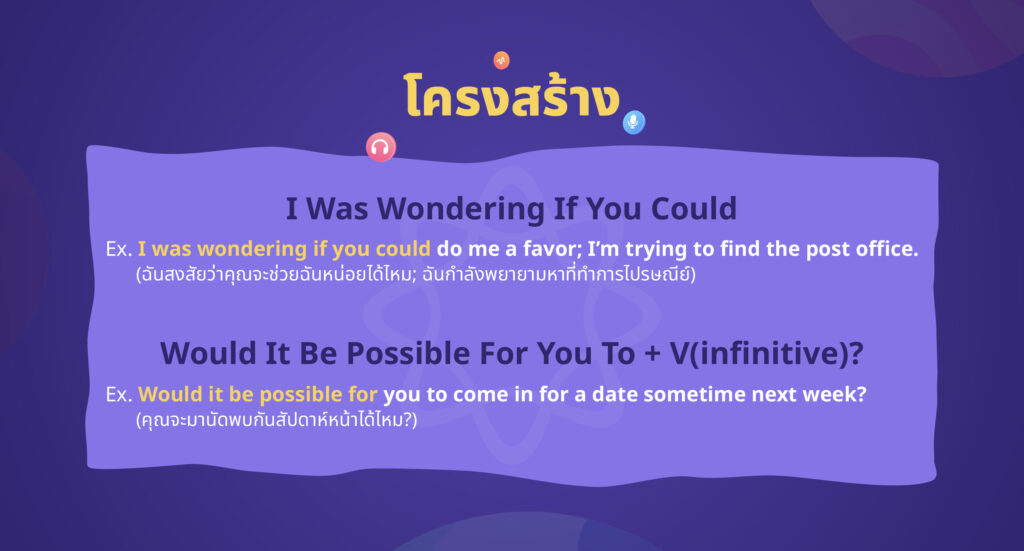
I Would Be Grateful If You Could/I Would Appreciate It If You Could
โครงสร้าง:
| I Would Be Grateful If You Could/I Would Appreciate It If You Could + V(infinitive)? |
นี่คือประโยคขอร้องที่ใช้บ่อยในจดหมายและเอกสารที่เป็นทางการ ลองดูตัวอย่างต่อไปนี้:
- I would be grateful if you could send me a book. (ฉันจะรู้สึกขอบคุณมากถ้าคุณสามารถส่งหนังสือมาให้ฉันได้)
- I would appreciate it if you could bring me some fruits. (ฉันจะซาบซึ้งมากถ้าคุณสามารถนำผลไม้มาให้ฉันได้)
- The manager would appreciate it if you could come to the company’s party tonight. (ผู้จัดการจะยินดีเป็นอย่างยิ่งหากคุณมางานปาร์ตี้ของบริษัทคืนนี้ได้)
คำศัพท์ภาษาอังกฤษที่เกี่ยวข้องกับการขอร้อง
| คำศัพท์ | การสะกดคำ | ความหมาย |
| require | /rɪˈkwaɪr/ | ขอร้อง |
| request | /rɪˈkwest/ | คำขอ/คำเสนอ |
| demand | /dɪˈmænd/ | ความต้องการ |
| requirement | /rɪˈkwaɪərmənt/ | คำร้องขอ |
| ask | /æsk/ | ถาม |
| beseech | /bɪˈsiːtʃ/ | ขอร้อง/อ้อนวอน |
| boon | /buːn/ | สิ่งที่ปรารถนา/คำขอ |
| challenge | /ˈtʃælɪndʒ/ | ข้อเรียกร้อง |
| desire | /dɪˈzaɪər/ | ความปรารถนา |

วิธีการตอบรับคำขอร้องภาษาอังกฤษ
ตอบตกลง
| วิธีการตอบรับ | ความหมาย |
| Sure here you are. | ได้อย่างแน่นอน |
| Okay. | ได้ |
| Yes, of course. | ได้แน่นอน |
| Yes, that’s fine. | ได้ สบายมาก |
| Certainly. | แน่นอน |
สำหรับโครงสร้าง Would/Do you mind: No, not at all หรือ No, of course not.
>>> Read more:
การปฏิเสธ
| วิธีการตอบรับ | ความหมาย |
| I’m afraid I can’t. | ฉันเกรงว่าฉันไม่สามารถทำได้ |
| Sorry, but… | ขอโทษนะ แต่… |
| I’d like to, but… | ฉันอยากทำนะ แต่… |
| I’m sorry. I won’t be able to help you with that. | ฉันขอโทษนะ ฉันไม่สามารถช่วยคุณเรื่องนี้ได้ |
| I wish I could help, but I’m busy. | ฉันอยากจะช่วยแต่ฉันยุ่งอยู่ค่ะ |
| Unfortunately. No, I’m sorry. | น่าเสียดายที่ไม่ได้ ฉันขอโทษ |
>>> Read more: ตัวอย่างประโยคปฏิเสธอย่างสุภาพในภาษาอังกฤษที่จำง่าย
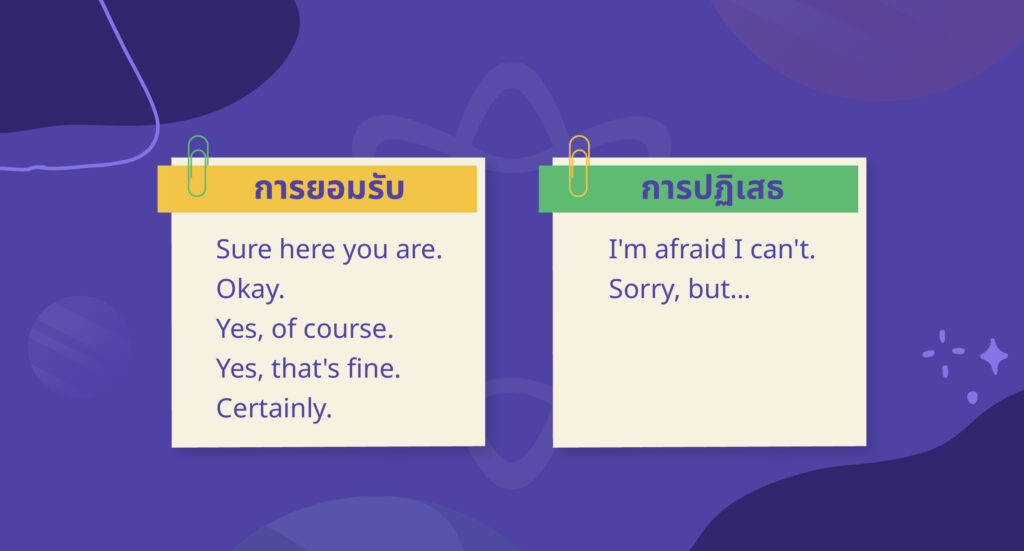
ด้านบนคือ 7 ประโยค ขอร้อง ภาษาอังกฤษ ในชีวิตประจำวันพร้อมวิธีการตอบรับที่สามารถใช้ได้ในแทบทุกสถานการณ์ ลองมาจดบันทึกไว้กับ ELSA Speak เพื่อใช้ในสถานการณ์ต่าง ๆ ได้อย่างคล่องแคล่วนะ!